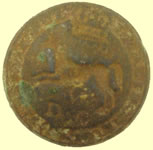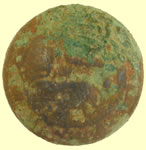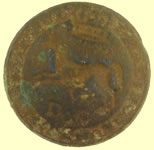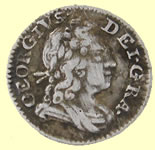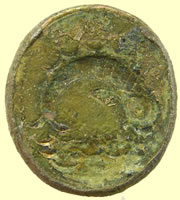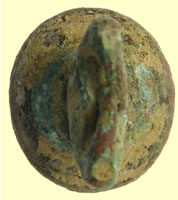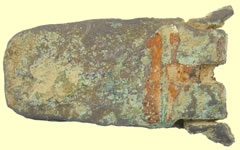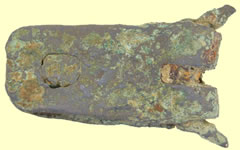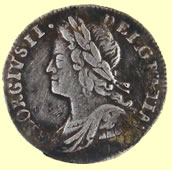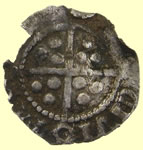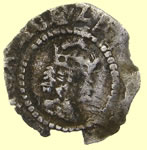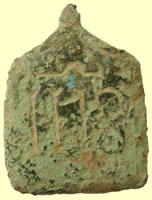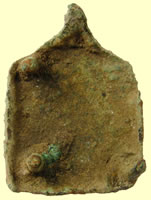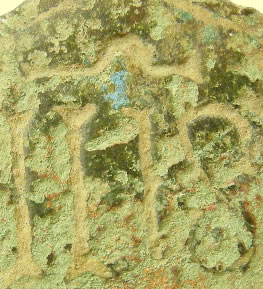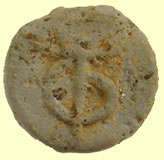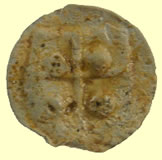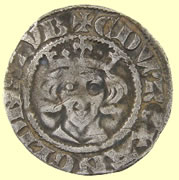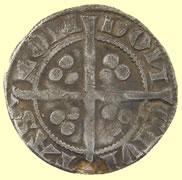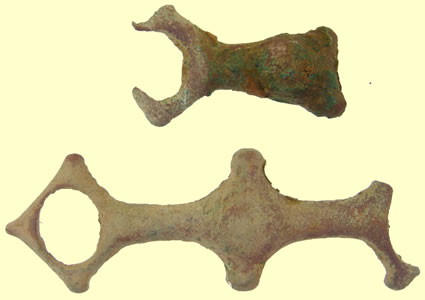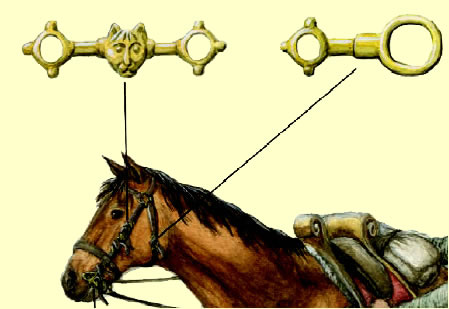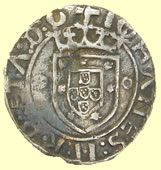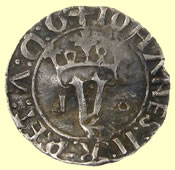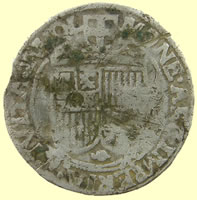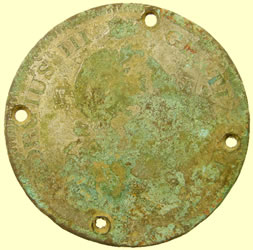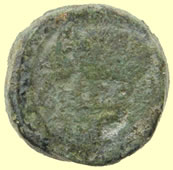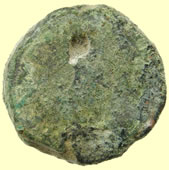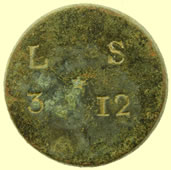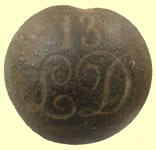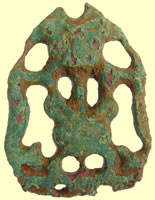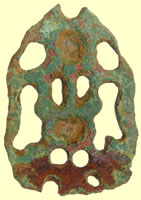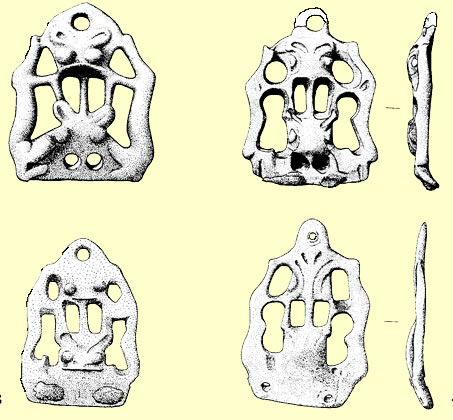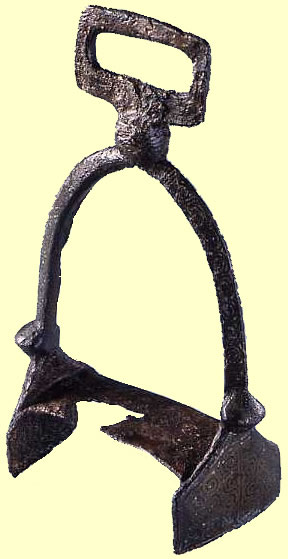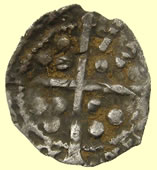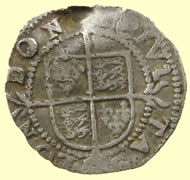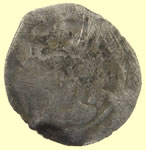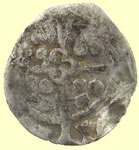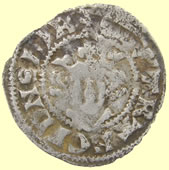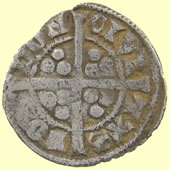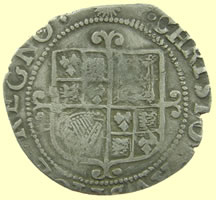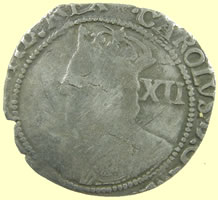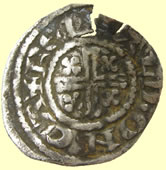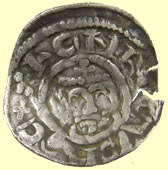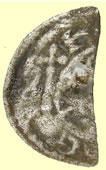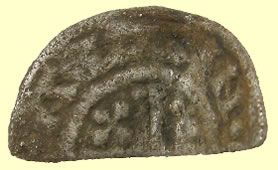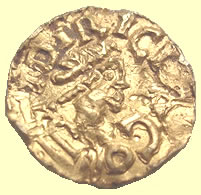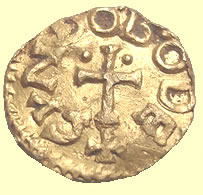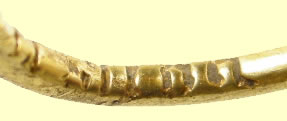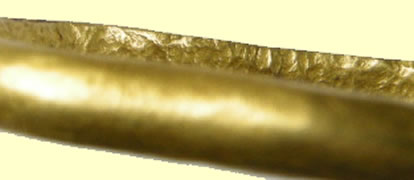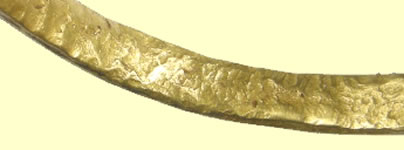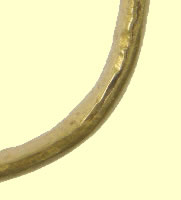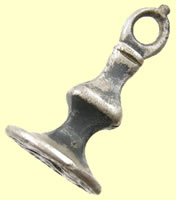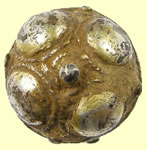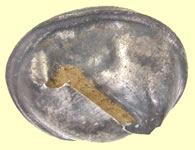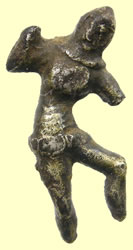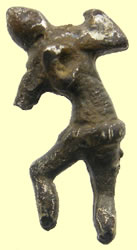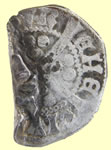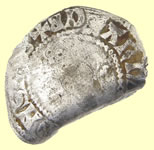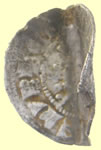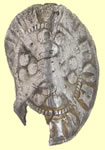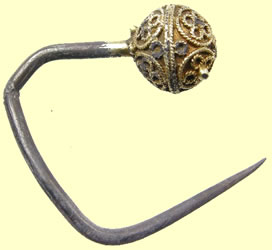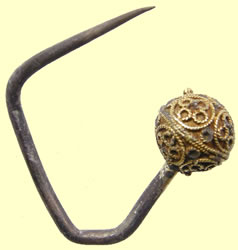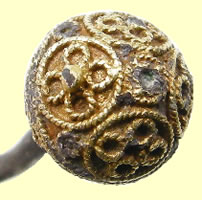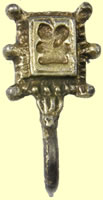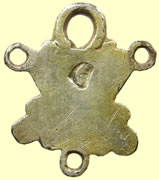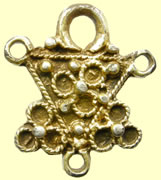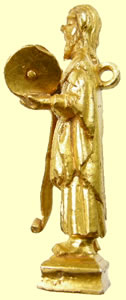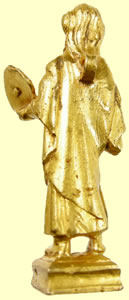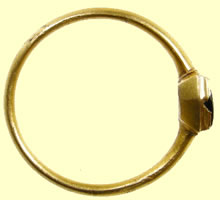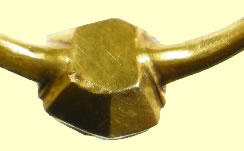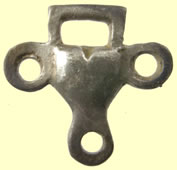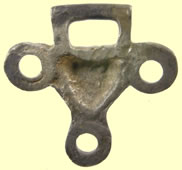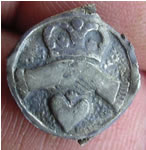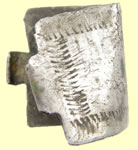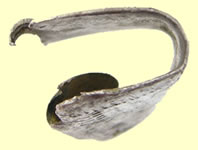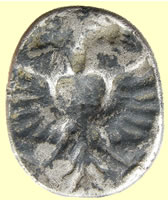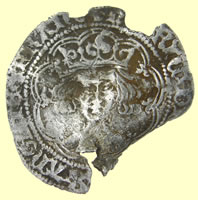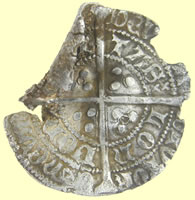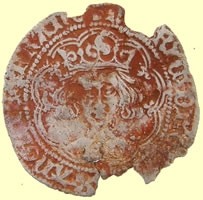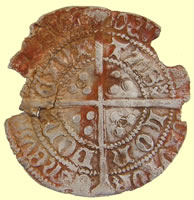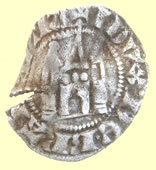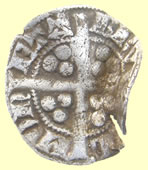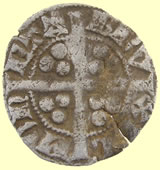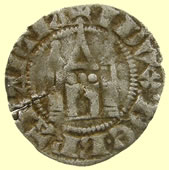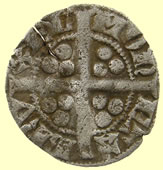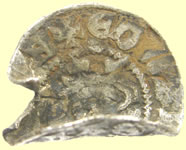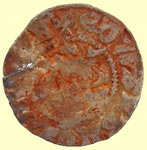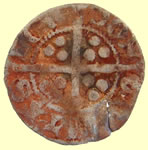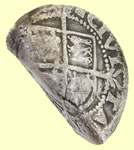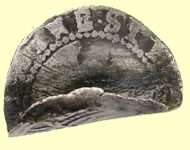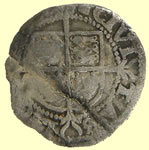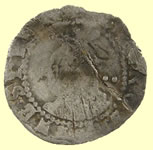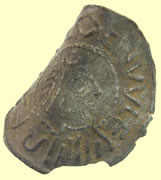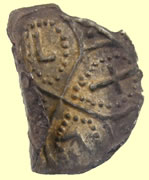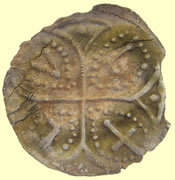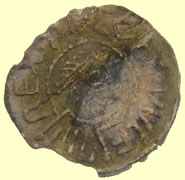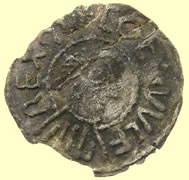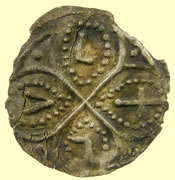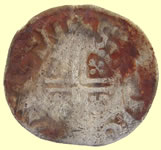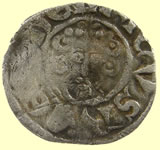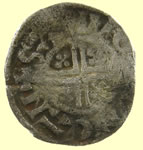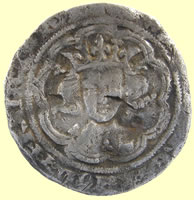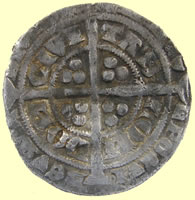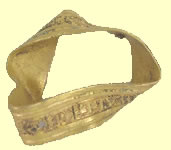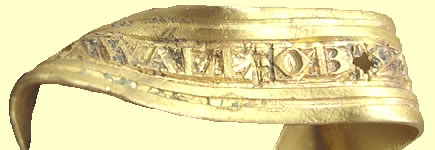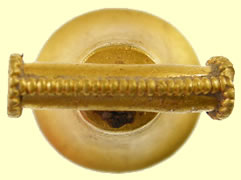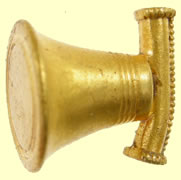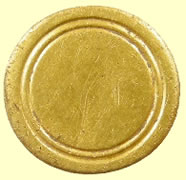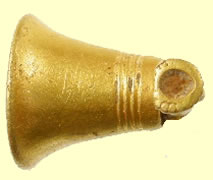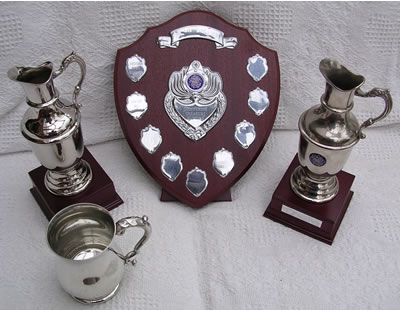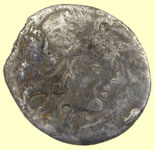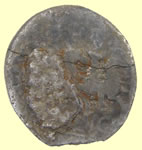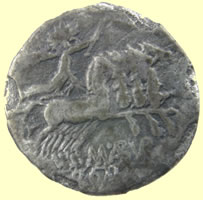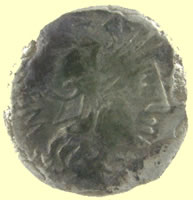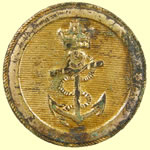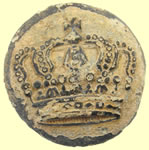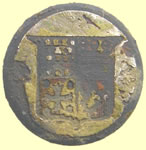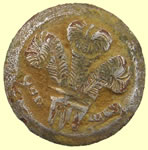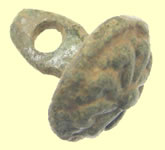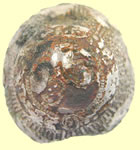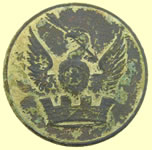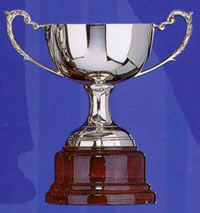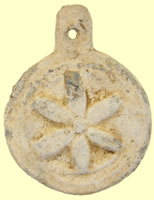

Metal detecting holidays in England with the World's most successful metal detecting club.
Twinned with Midwest Historical Research Society USA
Oct 2009 Latest news Archived Page |
2nd Oct 2009 Neat seal matrix - Another Saxon penny - more slots opened up The guys are still doing amazingly well considering that we have not had a decent rain for months. Luckily the fields have now been rolled like billiard tables as the farmers put in the seeds. Digging is easy but we are still getting no depth. A couple of new sites however are just like rock so we can't get on them to start hot spotting. I have opened up more slots on the 7th Nov by which time we must have got some rain to compress the fields and can then get on these sites. Another new site will hopefully be available to search from the 24th Oct, a dozen new fields in a prime location. I am waiting to get the contract signed as the farmer is very busy out there working on his land. Guys last day ended well with Toronto Boris finding a stonking sliver seal matrix treasure. Ohio Eric found another rare Æthelred Saxon silver penny that I have sent off to the Fitzwilliam museum for recording and confirmed ID. It appears to be a later version of the similar coin found earlier in the week. More great finds and hammered silver posted to the latest finds page Sept 2009 hunt page.
995-7 Late transitional period - Æthelred II 'crux' type South Eastern mint bust type Fig 7 - Eadpold, moneyer Bar headed bust left Voided short cross with C,R,V,X in angles Obv + AEDELRED REX . ANGLO\X, written with sperate R & X Rev + EADPOLD M : U CAENT - Cantebury mint Æthelred the Unready, or Æthelred II,(c. 968 – 23 April 1016), was a king of the English (978–1013 and 1014–1016). He was a son of King Edgar and Queen Ælfthryth. His reign was much troubled by Danish Viking raiders. Æthelred was only about 10 (no more than 13) when his half-brother Edward was murdered and was not personally suspected of participation. But as the deed occurred at Corfe Castle by the attendants of Æthelred's mother, it made it more difficult for the new king to rally the nation against the invader, especially as a legend of St Edward the Martyr soon grew. Later, Æthelred ordered a massacre of Danish settlers in 1002 and also paid tribute, or Danegeld, to Danish leaders from 991 onwards. In 1013, Æthelred fled to Normandy and was replaced by Sweyn, who was also king of Denmark. However, Æthelred returned as king after Sweyn died the following year. "Unready" is from Anglo-Saxon unræd, meaning ill-advised
Stunning 17thC seal matrix - reported to museum as treasure
Interesting grasshopper figurine - not sure of date one for the museum
1897 Zuid Afrika republic coin - 2 shillings (24 pence)
|
||||||||||||||||||||
30th Sept 2009 Confirmed Saxon penny ID - Scottish hammered silver - Bronze age axes A new site that has already produced a 1300 BC gold ring last week also produced two 850 BC axe head fragments off two different fields today and yesterday. Both fields also have signs of bronze casting waste indicating these areas might have been used as a foundry for making them.
2 - 850BC Bronze Age socketed axe head fragments 25.51mm L ---- 23.51mm L Scottish hammered silver coins are a rare find here in the south of England. Usually we get one a year but a new site we started hunting this year must have had a huge Scottish presence back in the 13thC as they are spread over 3 fields. Great early finds. Dr Martin at the Fitzmuseum has sent me back the revised ID on the Æthelred Saxon coin. It is a class 2 bust and is recorded as EMC 2009.0327 on the National early medieval corpus database. More great finds and hammered silver posted to the latest finds page Sept 2009 hunt page.
Thank you for letting us know about this very new find (EMC 2009.0327). A Late Transitional coin of the Crux type would be an fairly uncommon find, but unfortunately this is not Late Transitional. The bust is North Fig. 2 (note the double drapery in front in Fig. 7) and the R and X are not separate. These differences may not be easy to spot if you do not see large numbers of Anglo-Saxon coins on a regular basis. Your readings of the inscriptions are very helpful as they would be impossible to recover in full from the images. With thanks, Martin
1247 Henry III hammered silver voided long cross penny - Class IIIA Obv HENRICVS REX Rev WIL/LEM/ONC/ANT - Moneyer Willem of Canterbury mint
|
||||||||||||||||||||
29th Sept First modern gold of the season and a Saxon silver penny Cal Sarah banged in her first ever gold coin and the first milled gold of the season, really crisp Victorian half sovereign off a brand new field. Then Can Boris found a monster on the same field, Saxon silver penny and then a mint Henry VII groat . Great days detecting. More great finds and hammered silver posted to the latest finds page Sept 2009 hunt page. Updated the gold page with the latest finds
995-7 Late transitional period - Æthelred II 'crux' type South Eastern mint bust type Fig 7 - Eadpold, moneyer Bar headed bust left Voided short cross with C,R,V,X in angles Obv + AEDELRED REX . ANGLO\X, written with sperate R & X Rev + EADPOLD M : U CAENT - Cantebury mint Æthelred the Unready, or Æthelred II,(c. 968 – 23 April 1016), was a king of the English (978–1013 and 1014–1016). He was a son of King Edgar and Queen Ælfthryth. His reign was much troubled by Danish Viking raiders. Æthelred was only about 10 (no more than 13) when his half-brother Edward was murdered and was not personally suspected of participation. But as the deed occurred at Corfe Castle by the attendants of Æthelred's mother, it made it more difficult for the new king to rally the nation against the invader, especially as a legend of St Edward the Martyr soon grew. Later, Æthelred ordered a massacre of Danish settlers in 1002 and also paid tribute, or Danegeld, to Danish leaders from 991 onwards. In 1013, Æthelred fled to Normandy and was replaced by Sweyn, who was also king of Denmark. However, Æthelred returned as king after Sweyn died the following year. "Unready" is from Anglo-Saxon unræd, meaning ill-advised
1844 Victorian gold half sovereign
Excellent find Damianus Krauwinckel Master 1543 - first active member of the Krauwinckel family 'Lion of Saint Mark' jetton Lion of St Mark standing left ,nimbate and winged, holding book of the Gospels Obv DOMIANVS rosette KRAVWINCK Rev Imperial orb surrounded by cross patty - fictitious inscription
1485 -90 Henry VII hammered silver half groat 19.80, 1.49g CIVI/TAS/CAN/TOR - Canterbury mint Class II Archbishop Morton
|
||||||||||||||||||||
28th Sept 2009 Another gold ring and continental silver
Mass Mike found another gold ring which is hall marked older than first thought. The guys are finding some interesting continental silver as we are situated next to the coast of Europe, I really like the Russian coin. More great finds and hammered silver posted to the latest finds page Sept 2009 hunt page. Updated the gold page with the latest finds
1855 - 9 carat gold ring - 2.58g, Mintmark Birmingham (anchor G)
Neat relic - musket ball still lodged in wood
Heart attack find on a Celtic site - 1975 gilded FIFA football trophy key ring
|
||||||||||||||||||||
26th Sept 2009 More treasures at the inquest - Celtic gold recorded The Oregon boys left today after an amazing hunt where Ed was on fire and got Saxon, Celtic and that staggeringly old 1300 BC gold ring. His buddy Org Gary got that stonking Medieval stirrup type sapphire gold ring and now they have to wait to see the curators report from the British museum on their finds. I received the official letter from Chelmsford coroners court yesterday and 9 of our reported treasures were all declared treasure by Mrs Beasley Murray the presiding judge. They must have added a couple more treasures to the list at the last minute as I thought we only had 7 being heard, the extra ones were Can Dan's silver cufflinks and Idaho Gerry's medieval silver terminal. These will all now go forward to the valuation committee stage where a board of experts will decide on their current market value and send both the landowner and finder an offer to purchase. More great finds and hammered silver posted to the latest finds page Sept 2009 hunt page. I have updated the forum competition page with those guys bags I have counted the coppers found. Forum comp
CCI 09.3448, CCI 09.3450, CCI 09.3451 John Stills who took over the Celtic Coin index from Philip De Jersey has just sent me more info on the Celtic gold coins I sent to him and there CCI reference numbers. Thanks for the three gold coins to record, the first
Gallo-Belgic D you sent is now CCI 09.3448, the second is 09.3450 and
the Addedomaros stater is 09.3451. The Gallo-Belgic D quarters
are both Scheers class 3, probably struck around the same time as the
earliest Gallic War uniface staters, in other words around 58-56 BC.
The second coin is a slightly unusual variety, known from only a couple
of reverse dies, with four rather than two symbols below the wavy line
on the reverse; from memory there are 30 or so known of this type so
it's quite scarce
The Addedomaros has been struck from a very worn obverse
die and a highly flawed reverse one, giving the appearance of 'molten'
metal, especially when the blanks were likely to be quite hot and soft when
struck. Addedomaros staters of this 'whorl' type seem to
have been struck in quite large quantities, and to speed up production
the dies were often kept in use until they were heavily worn and flawed
to avoid cutting new ones. Although they tend to be less desirable
from a collector's point of view they're very useful to anyone putting
trying to establish the sequence of dies, as Philip and I have both
done with this series.
All the best
John
A happy Oregon Ed
Scottish 1249 Alexander III hammered silver penny - Class 3 Obv ALEXANDER REX Moneyer Nicole of Edinburgh
Largest 18thC toy cannon I have seen - over 4 inches long
1485 Henry VII hammered silver sovereign penny - Keys by shield - Archbishop Rotherham - pillars to throne York mint
|
||||||||||||||||||||
25th Sept 2009 Two more great gold ring finds - Saxon hoard story
Massive million £ hoard found - watch the video Huge hoard of Anglo-Saxon treasure uncovered in UKYet more unbelievable finds being made including this stonking medieval gold ring find by Billericay Mark. The inscription on the inside is a French family but the outer legend is slightly worn with use. Both the landowner and museum have been informed that it is treasure. Fl Gene then finds another really neat gold ring, this time turn of the century signet ring. One of my favourite finds is that superb 18thC 91st Regiment of foot belt buckle.I have posted a bunch more neat finds to the latest hunt page Sept 2009 hunt page. I have some really great finds to upload yet including a really crisp medieval Scottish hammered coin.Updated the hoard and treasure page with the latest finds Updated the gold page with the latest finds
Medieval gold ring - full inscription inside and out - reported to Colchester museum as treasure Inner - PEULET Z (FRENCH NAME ) Outer - SF UNY 17.18mm, 4.17g
20thC mans gold signet ring
Tiny 1603 James 1st hammered silver halfpenny penny - portcullis type
Superb find - 18thC 91st Regiment of foot belt buckle The 91st Regiment of Foot was raised four times. First raised in 1759 but disbanded in 1763. It was raised again in Shropshire as the 91st (Shropshire Voluntiers) in 1779. It was sent to the West Indies in 1780 serving as a garrison force on St Lucia and Barbados. In 1784 it was disbanded in England.
|
||||||||||||||||||||
24th Sept 2009 The monster find and a confirmed Roman bronze hoard - come and help us Our latest treasures at the coroner's inquest on the 23rd Sept made the papers. 'Among the treasures was a medieval gold figurine of John the Baptist, discovered in Tendring in October last year, made in the late 15th century. The item is “unusual” because he appears as a prophet.' This find from Org Ed is the absolute monster, 3300 year old bronze age gold ring. Simply stunning find on new land we are just wandering around aimlessly trying to hot spot. Reported to both Colchester museum and landowner as treasure. 'While the object belongs broadly to the class of Bronze Age penannular rings, it has more in common with Middle Bronze age type (which includes composite rings) than with the later Bronze age series Date c 1300-1150 BC' See Annual treasure report (2006 T451) for a similar example
Monster find -Circa c 1300-1150 BC Bronze age gold open backed triple banded gold ring - penannular 3.48g, 13.73mm dia x 6.74mm H Reported to Colchester museum as treasure
Mass Bruce, Scott and Mike found more Roman bronzes yesterday to add to the 7 they found earlier so I spoke to the museum this morning and it has been officially declared a hoard. The land is very dry and just rolled so no doubt we will be adding more to the 'pot' over the coming months as moisture and compression give us more depth. We have found several gold hoards and Roman silver hoards over the previous seasons but this is our very first Roman bronze hoard, fantastic find. Mark Lehman has ID'd the 'hoard' Romans on the latest finds page Sept 2009 hunt page and given his views based on the current coins found in the hoard. Given that all these "hoard" coins so far have been
of Magnentius and Decentius, and all show little to no wear - check
the hair and ear detail - it's probably reasonable to assume that
they were a freshly minted group of coins which had been kept together
from the time they were made until they were buried. The one clear
mint mark seems to be Lugdunum (Lyon) - I'll be interested to see
if other mints' ID's are found. [I just checked the earlier images
and the one relatively clear mint mark appears to be Trier - so although
they are all from the same time-frame, it probably wasn't
a "sealed mint bag" situation - but it still dates the
hoard very tightly to 360-365 or so unless we have some evidence
that their coinage was demonetized]
I'm thinking that depending on how many pieces eventually
come to light, this might be the quartermaster's purse (or chest) for
a detachment of troops sent from the continent to Britain - perhaps
on garrison duty - although the 360's is getting pretty late for organized
and active Roman involvement in Britian. At very least, we can
tell that it was a group of freshly minted coins which, for whatever
reason, had been kept together - I suppose a frugal soldier might have
saved a few months' pay - or a merchant might have done some ad-hoc "banking" - but the ultimate numbers of the hoard will tell us
more.
Mark
New Barn accommodation near the new 60 field site The guys on the members forum have been 'googling' looking for suitable accommodation near our new 60 field plot. They have found a really smart newly converted Barn with 3 separate apartments 2 miles from the site. Each one is really nice with bedroom, lounge and kitchen facilities. I spoke to the owner and she has a another barn we can store any wet gear and shovels if needed. She also has further really smart B&B accommodation and can cater for another 5 guys if needed. She also would be happy to supply packed lunches for the guys to take to the fields with them. The 3 apartments are : a double, a twin and a triple (2 bedrooms). They are very well equipped and here is the spec of the double.
Kingsize bed (5 feet wide) and two bedside cabinets
with bedside lights. Three seater leather sofa. Electric cooker. Shower (no bath). Remember this is a brand new site that has never been detected before and is it is only available to hunt from the end of bird hunting season Feb 1st to April when the crops grow too high. If you fancy being the first on this plot then come along and give us a hand as this will take us years to try and cover. We need to try and throw as many bodies as possible out there as we also still have our 250 normal fields to cover as well. It is a serious Roman area next to Colchester with a known documented Roman village at it's centre, roman roads, dykes and medieval churches cover it. This will be a go as you please hunt ( as many hunting hours as you like ) with your own vehicle or shared, your choice. The plot is massive and impossible to walk to without transport. I will be producing a new page on our site shortly giving more detail. A senior member will be in charge and can drive up to a maximum of 7 guys with a NA license if required. You will get the normal full support with photographing and ID'ing of finds, liaising with museums and full export documentation, application and approval as part of the package. Drop me a mail if you are interested newland@colchestertreasurehunting.co.uk
|
||||||||||||||||||||
23rd Sept 2009 Hard as a rock but great rewards - another Celtic gold - Inquest day
5 amazing treasures of ours, including that huge sapphire medieval gold ring and the medieval gold statue, are having their inquest at Chelmsford Coroners court today. They will probably make the local paper and I will post the article if it does.
A new site yesterday was hard as a rock but the guys managed to chisel out some more great finds. Org Gary even managed to bend his custom pick axe digging a good target. Mass Mike, in very dry nuggety conditions, still managed to find the first full gold stater of the season, 45 BC Addedomaros who was a local King of Colchester. I have sent it off to the Celtic coin index for recording. That was our 73rd Celtic gold coin find, amazing. Loads more fields have just been ploughed and rolled and even farmers that normally do not plough their land to Nov are coming on line. There are probably nearly 200 fields for the guys to pick from but we desperately need is rain to help compress these suckers. I am totally backed up with posting finds and will try and get a bunch posted today to the latest finds page Sept 2009 hunt page. Updated the gold page with the latest finds
Gary tried to straighten it but now he has only two prongs left on his axe !!
45 BC Addedomaros Celtic gold coin 18.64mm, 5.61g sent to CCI for recording Very unusual die strike - gold appears to be in an almost non molten state during the strike
Saxon Stirrup terminal
|
||||||||||||||||||||
22nd Sept 2009 - 2nd Celtic gold of the season - Potential Roman hoard found Oregon Ed has found our 2nd Celtic gold of the season and another stonking 70 BC Morini 'boat tree' type. I have sent it off to the Celtic Coin Index for recording. This has a very unusual die type that is showing the obverse bottom inscription. This is only the 2nd Morini find of ours with that inscription showing, the other one was found over 6 years ago. Another exciting find on new land by an old river is 7 Roman coins found by NH Scott and Mass Bruce. I think they have potentially found a hoard as they are all of the same age and in very close proximity to each other. For it to be officially reported to a the museum as hoard there has to 10 bronzes or more. The land conditions were very poor, dry and nuggety so a return visit when we have had some rain and compression will no doubt turn up more. They are in remarkable condition so it suggests they came out of a pot. I sent them off to Mark Lehman and his fascinating reply is posted below the coins.
70BC Morini 'boat tree' type Celtic gold 1/4 stater 1.48g, 10.28 mm
Mass Bruce's Roman
NH Scott's 6 Roman's Unless I am mistaken, all 7 of these belong to the
brother team of Magnentius & Decentius - a fairly short-lived (350-353
AD) Augustus/Caesar pair of the sort promoted to Augustus, ad-hoc, by their legions. This was a very common story during the
chaos-years of the later 3rd century, but happened far less
often in the 4th. Magnentius had been a top general
of Constans' - his army proclaimed him Augustus and since Constans did
him the favor of being captured and executed conveniently quickly
- within a few months - Magnentius was duly recognized as Augustus in
most of the Western provinces in 350. The next year he elevated
his little brother Decentius to be his colleague Caesar.
Constantius II was not pleased by the Western upstarts
and within 2 years had defeated them in a couple of significant
battles. Realizing the jig was up, they both committed suicide
in 353.
Although these reverse types are known for other rulers
(for whom they are pretty rare), they are especially associated with
Magnentius & Decentius, both of whom were always portrayed "bare
headed" - no laurels or diadems, etc. - and both of whom sported distinctive
"mullett" hairdos like you see on the clearest specimens here.
Since I believe the obverse legend on that nice one of Bruce's ends
in "AVG", I'd say it's most likely Magnentius. Any on which
the obverse legend ends (around 5:00) in CAES, CAESAR, NOB C,
or NC can safely be assumed to be Decentius.
The type with the 2 Victories resting shield
inscribed: VOT / V / MVLT / X on a cippus (or just holding it between
them) woul have a legend like: VICTORIAE DD NN AVG ET CAES - and
was common for both of them. The large Chi-Rho Christogram reverse
was used on both the centenionalis and short-lived double-centenionalis
denominations - it's not really scarce, but is sought-after making it
a bit more expensive for those wanting to buy one. This is a common
factor in ancient coins, those with some sort of "religious" reference
are always found desirable by folks who have no other interest in ancient
coins, thereby driving up the prices (like the so-called "Tribute Penny"
denarius of Tiberius - of which your diggers have found several - which
is the most common silver coin of the early 1st century, but sells for
3-4 times as much as any other).
This pair struck only in the Western mints: Amiens,
Trier, Lyon, Arles, Aquilea, Rome and Siscia
You have the Chi-Rho reverse 90º counter-clockwise
out of alignment, by the way. in the left and right interstices of the
Chi are "A" and "W" (Alpha/Omega). You can see these letters pretty
clearly on this specimen although the "P"-shaped top of the Rho seems
to have taken too much damage to be visible.
Some examples from my collection:
Magnentius: Chi-Rho double-centenionalis: http://www.stoa.org/gallery/album167/26_Magnentius_SAL_AMB
typical 2 Victories:
2 Victories from a British MD find:
a couple less-common reverses:
Decentius:
Mark
Mark Lehman has sent me futher information on Fl Don's Roman silver find
Under closer examination and tweaking the images a
little, I'm pretty sure this piece at least began its career as a half-siliqua
of Arcadius, 383-408 AD. If I am reading the lower letter-seriphs
on the obverse correctly, what's visible should, I believe, read
"D N ARCADI [ VS P F AVG]" - the legend breaking between I -
V is correct for Arcadius too.
Interestingly - and I'm not sure whether this "proves"
anything or not, I also have a siliqua of Arcadius showing some clipping
and which also weighs exactly 0.7gm http://www.stoa.org/gallery/album83/02_Arcadius_Sil_MIL
- this complicates the issue a little, since I can't see any features
on the reverse of your coin which would indicate either Roma seated
left (legend: VIRTVS ROMANORVM or VRBS ROMA) or a "Vota" type with vows:
VOT / X / MVLT / XX in a wreath - which are the only 2 reverse types
for Arcadius' siliquae - but that piece from my collection might
also be a siliqua officially clipped-down to sceat-size. Certainly
to make a sceat out of a half-siliqua would require the removal of a
lot less metal - or your piece might merely be a skimpy, underweight
half-siliqua with no clipping.
However, the reverse of yours I cannot be quite
as certain about as the obverse, but I believe it is VICTORIA AVGG
(or AVGGG, depending on the era - 2 emperors before, or 3 after
the ascension of Theodosius II in 402) with Victory advancing left holding
wreath and palm. I believe I can see [VI] CTOR [IA
AVGG(G?)] between 9:00 - 11:00. The crook-like feature
at the top-right should be Victory's arm holding up a wreath at about
12:00. Although these are AE denominations and some
years earlier, the general design of the reverse should be the same
or similar as one or the other of these two: http://www.stoa.org/gallery/album82/09_Valentinian_I_SER_ALE or http://www.stoa.org/gallery/album82/37_Valentinian_II_VIA_SIS
I can't make out anything at all for a mint mark,
so I can't tell you the city of origin with certainty, but it appears
that Arcadius struck half-siliquae only at Milan (MD in exergue) Aquilea
(AQPS in exergue) or Rome (RM in exergue). In case you can
make out letters at the bottom, that's the list of probable exergual
mint marks to look for on a half-siliqua of Arcadius.
Good digging this season!
It's encouraging that your first Roman is an interesting
AR instead of an AE grot for a change!
Mark
Medieval dagger chape
|
||||||||||||||||||||
21st Sept 2009 First Celtic gold of the season - Roman silver ID - More amazing finds Updated the hoard and treasure page with the latest finds Updated the gold page with the latest finds Uploaded a load more to to the latest finds page Sept 2009 hunt page
70BC Morini 'boat tree' type Celtic gold 1/4 stater 1.46g, 11.33 mm
Tiny Mid 4thC Roman silver coin - clipped to appear like a Saxon sceat 13.2mm,0.70g
Mass 'axe hoard' Bruce dug the first Celtic gold of the season and what a beauty, the earliest Celtic gold's you can find at 70 BC. It has been several years since Bruce, who found part of a Celtic gold coin hoard on display at the museum found his last gold and I was standing right next to him when he dug it, amazing moment. I have sent it off to the Celtic Coin Index for recording and the CCI reference. I have had a fascinating e-mail in from Mark Lehman our Roman coin expert on the crispy Roman silver found last week. I had never seen such a small Roman silver and at the time Fl Don dug it he thought it was a Saxon Sceat. That area is proving to be avery good Saxon area for artifacts. Mark's reply fits perfectly for that area. The siliquae of the late 4th and early 5th century
were quite small and rather lightweight - it tends to show,
among other things, how little silver the Romans had easy access
to at that point. Your piece may be a fractional siliqua struck
with full-size siliqua dies, a contemporary copy, or may have deteriorated
in situ - or there may be yet another story behind this one. There
was a time in the post-Roman era when existing siliquae were officially
clipped down to a size and weight to circulate alongside Saxon sceatta
- and this may be a product of that or a similar era and process.
I will look forward to seeing whatever may come of
your cleaning efforts, since there's not enough showing to tell
you anything you don't already seem to know about this one.
Mark
I replied to Mark that the coin is too fragile to try and clean and here was his 2nd reply
I will have another look at your photos, but I'm
afraid that there probably just isn't legend enough on the obverse
nor detail enough on the reverse to pin it down to a specific emperor
or even be certain whether it was originally official issue vs
contemporary copy, etc. I have in my collection a Valentinian
dynasty-era "subaeratus" fourree of a silique which has been
cut down to sceat size and weight.
So I do tend to suspect that your piece was
either produced in or altered to its present form in the Saxon era
Evidently they didn't much care if the coins they
were clipping were official issues, copies, or counterfeits,
but this is only one example of an earlier "obsolete" currency being
clipped-down to a lower standard weight by a succeeding culture
- this happened often in the European countries bordering the Byzantine
Empire (Bulgaria, Romania, etc) and among the Islamic "Arab Sasanians"
who clipped the earlier Zoroastiran Sasanian dihrems down to the size
of their circulating dihrems a couple centuries later.
Mark
1509 -26 Henry VIII hammered silver groat - Pheon mint mark 2.87g, 26.93mm
1279 -Edward 1st hammered silver penny - Cross Potent Class 3f - Lombardic N Obv EDWR ANGL DNS HYB Rev CIVI/TAS/LON/DON - London mint 1.18g, 18.71mm
|
||||||||||||||||||||
19th Sept 2009 Another 3 treasures reported and more great finds The guys are out and about making some great finds including 3 treasures, 2 medieval silver mounts and a decorated silver bodkin needle. The guys are really on their game finding two tiny Venetian silver soldino coins and one of the tiniest hammered silver coin you can find a Charles 1st silver half penny. Fl Don found a really nice rare 5thC Roman silver coin I have yet to clean up. I have posted a load more great finds to the latest finds page New finds page Sept 2009.
1501-1521). Rev: LAVS TIBI SOLI (Thee Alone be Praised). Haloed figure of Christ holding a cross. Obv: LE LAV DVX S M V (Leonardo Lauredan,
Doge. St Mark of Venice.) Doge kneeling before Saint Mark.
Medieval silver Fleur De Lis hat badge - reported as treasure to museum
Probably one of the smallest hammered silver coins you can find, 1/3rd the weight of a Medieval silver farthing 1625-42 Charles 1st hammered silver
half penny - Rose each side - no legend type
0.17g, 9.5mm
Medieval figurine mount 32.86mm H , 10.30g
|
||||||||||||||||||||
18th Sept 2009 Stunning jettons and hammered I have created a new finds page to speed up load times, just uploaded a bunch more. New finds page created Sept 2009 Some of the jettons and hammered found by the guys on another new site yesterday are the finest examples I have ever seen. The land up until recently had been pasture and therefore has not suffered the rigor of ploughing, oxygen, fertilizer and water. To a lover of Jettons like myself these are truly staggering finds and if you look at the jetton page on this site you will see the normal effect of corrosion of coins of this age. Hopefully there are more of the same on the new site waiting to be discovered. Some of the hammered silver like the Henry VII penny below are in mint condition also.
Mint condition 1340 AD French Jetton Crown introduced in 1340 by Philip VI (1328-50) Royal Crown with 3 rosettes across body of crown Rev Triple banded straight cross fleuretty AV
1310-14 Sterling bust English Jetton Edward II Class XI Rev - Long cross patonce 6 pellet clusters in angles, border pellets Obv - Bust Class II in circle, border pellets
1485 Henry VII hammered silver sovereign penny - Keys by shield - Archbishop Rotherham - no pillars to throne York mint
1609 James 1st hammered silver half goat
Beautiful decorated medieval buckle chape - Fleur de lis design and 3 rivet fixing
Heart attack find - Celtic style silver ring hall marked 925 silver
|
||||||||||||||||||||
17th Sept 2009 More great finds The guys are still making some amazing finds and we had rain for the first time in weeks to soften the ground up. They picked a brand new site this morning that last week was impossible to dig and they had already found a dozen hammered silver coins by lunchtime. I am totally backed up with posting the guys finds but have just uploaded a load more to to the latest finds page Sept 2009 hunt page. There are just so many neat do dads like this Victorian model crown coin.
Victorian model crown coin mdcccxlviii (=1848) Joseph Moore was a noted Birmingham medallist (1817 - 1892) who trained under Halliday. He was then in partnership as Allen & Moore (1840 - 1858) and the A&M initials are on many pieces of this period. From 1859 onwards he was trading in his own name with the Moore business eventually being acquired by Fattorini & Sons in 1920. In 1844 Moore produced models (patterns) of a bimetallic penny as a suggestion for a change in the currency of the realm by using lighter and smaller coins than the much heavier and larger "cartwheels" then still in general use. Later, in 1847 / 1848 Moore's firm produced a range of model pieces ranging from 1/16th of a farthing (6mm diameter) through to the bimetallic half pennies and pennies and up to the very ornate crowns, also bimetallic, and quarter sovereigns. The lower denominations were very small and not actual currency in force in the UK either at that time, or before or since. The smaller pieces were probably produced to enhance his own expertise and to market the larger pieces and they have readily become collectable today as "Model Coins". The bimetallic pennies - still seen in abundance today - were so popular with the general public that the Royal Mint had to make an official announcement that they were not legal tender. Moore meant them to be serious models for consideration as currency and most have "Model" on them which probably saved Moore from prosecution under the Counterfeit Laws.
1466/7 Edward IV hammered silver groat - Bristol (B on breast) Quatrefoils by bust - Crown initial mark Obv EDWARD DI GRA REX ANGL Z FRANC Rev VIL/LA+B/BIS/TOLL 25.6mm,2.88g
Lots of real nice coin weights being dug - medieval to 17thC
1247 Henry III hammered silver voided long cross penny - Class 2 Rev NIC(/OLE(/ON/ANT - Moneyer Nicole of Canterbury
Roman bust figurine finial- 42.39mm L , 22.07g
|
||||||||||||||||||||
15th Sept 2009 Best day of the season so far - monster treasure found - new land is a go from Feb I have posted more neat finds to the latest finds page August 2009 hunt page
I went and saw the new land yesterday and it is split into 3 parcels. We have permission on the first parcel which is 2400 acres, around 60 new fields and they are all joined together. The land has a known Roman village at the centre, Roman dykes, roads etc and several medieval churches. We will only be able to hunt this from the end of the pheasant shooting season from 1st Feb to April when the crops get too high. This is our largest landowner so a huge amount of hot spotting to be done from Feb. I will be posting maps on the members forum today so guys can start googling the crops marks, houses, dykes etc ready for off. I had a quick look at local accommodation in the area and there are some potentially good B&B's we can use so you can walk out the door and roam the 60 fields at your leisure. I will post more details later. Stonking find from Oregon Gary is this medieval gold ring, what a fantastic relic.
Medieval gold ring with sapphire - 24.12mm dia, 11.42g - report to Colchester museum as treasure All in all an amazing day on new land with 16 hammered silver coins found + a bucket load of great finds. One of the hammered, an early short cross penny, has one of the clearest legends I have ever seen on an obverse, beautiful. There was also an unrecorded Henry with a totally different legend from any Henry coin. This is amazing good strike and the SIE can be clearly seen. I will have to send it off to the british Museum expert for his views. Another bonus is it rained last night and was raining this morning so some moisture in the soil will really help with targets. Another dozen freshly rolled new fields have come on line so the guys are on another virgin plot this morning. I got an e-mail from Dr Martin Allen recording and ID'ing the Saxon silver coin find on the Medieval corpus database. The EMC number is a unique database entry for that coin. 'Thank you for this Series C1 sceat, which I have recorded as EMC 2009.0301. Good luck for the new season.' Martin The series C1 is an early coin with high silver content C 600 AD
Perfect legend on this example 1217/8 Henry III hammered silver short cross penny - Class 7a - 'A' has top and middle bar Obv HENRICVS REX Rev LVN ON CANT - Moneyer LVN of Canterbury mint
Tiny 1485 Unrecorded Henry VII 'brushed hair' type hammered silver halfpenny or farthing (average weight and sizes do not match either)- legend does match any known Henry's 10.88mm, 0.35g Obv HENRICVS A / SIE x H** Rev CIVI/TAS/LON/DON
|
||||||||||||||||||||
14th Sept 2009 Fantastic finds including a treasure and Saxon A freshly ploughed and rolled field the guys picked produced the first Saxon coin of the season from Oregon Ed. It is very unusual to have such a high grade of silver content in a Saxon and I have sent it off to Dr Martin at the Fitzwilliam museum for recording on the early Medieval Corpus National data base and ID. The guys found a bunch of neat relics including, bible mounts, Jettons, coin weights and a some amazing hammered silver in crisp condition. Billericay Mark found a mint medieval half groat and Can Ed got a beauty Archbishop Henry VIII half groat. I have posted more neat finds to the latest finds page August 2009 hunt page
600 AD Saxon silver sceat 1.20g, 12.12mm - Sent to the Fitzwilliam museum for recording and ID
Medieval gilded silver cherub mount - reported as treasure to Colchester museum 13.82mm H x14.84mm W, 1.05g
1553 Hans Schultes I 'Ship penny' jetton Obv Sailing ship facing left Rev Traditional 'four fleurs in a lozenge' crown HANS rosette SCHVLTES cross PO
1413-22 Henry V hammered silver half groat - pierced cross - mullet in centre of breast 20.59mm, 1.82g Obv HENRICxDIxGRAxREXxANGLxZFR+ Rev CIVI/TAS/LON/DON - LONDON MINT
2nd coinage 1533-1544 Henry VIII hammered silver half groat - TC beside shiled - Archbishop Thomas Cranmer) Inital mark Catherine wheel Obv HENRIC VII Rev CIVI/TAS/CAN/TOR - Canterbury mint 1.20g, 18.5mm
|
||||||||||||||||||||
12th Sept 2009 New land and neat finds - still no rain I have meeting with the new land owner early next week on the 100 + new fields we just acquired. I spoke with him today and he has a lot of hunting on his land at the moment so we might have to wait to the end of the hunting season to commence searching his land that will be a bummer. I will have more details next week after our meeting. Meanwhile lots more fresh ploughed and rolled land coming on line daily. A new site this season, in the middle of an old village, shows great potential and Atl Mike dug a neat Roman votive offering figurine. The two fields we tried out were covered with targets including a Knights templer badge, lots of buttons and coppers but only one hammered silver an Elizabeth 1st sixpence. Well worth a return visit later in the week. Another new field the guys tried out a couple of days ago around an old house site produced a whole range of early numbered military button and 4 more of those unrecorded 5th Dragoon guard buttons posted below. This site is also worth a return visit shortly. I have posted more neat finds to the latest finds page August 2009 hunt page
Roman votive figurine 48.34mm L, 14.68g
Medieval badges Ref Mitchiner p244 939 - 941
4- Unrecorded 5th Dragoon guards buttons - Crimea wars period
1720 George 1st milled silver penny
Really nice 17thC seal matrix - fish jumping out of water impression
|
||||||||||||||||||||
9th Sept 2009 120 new fields added - First gold of the season Cal Gail opened the seasons gold count with a pure gold medieval ring. It was found near a medieval nunnery so it could possibly have belonged to one of the nuns there. I have reported it as Treasure to the local museum and it will go on to the British museum for further tests.
C14thC Medieval gold ring 1.31g,20.40mm dia
Yesterday we were asked to hunt a new landowners site which is our biggest ever. 4000 acres, approx 120 new fields in Colchester and surrounding areas. I will be taking a trip to get the maps and the contracts signed shortly, hopefully we can start searching it straight away. We have also been offered another two huge plots in the same area, 3000 and 4000 acres each . That will potentially take us over 500 fields now to try and cover.
Medieval buckle with chape 34.73mm L
The weather out there is stunning but still no rain and the ground is dry as a bone. Luckily the fields are being ploughed and rolled so they are still digable but then become horribly baked. Guys are still finding a lot of targets but there is no depth without any compression and moisture. Atl Mike made a couple of great finds, an unrecorded henry VII half penny and a really nice 13thC gilded buckle with integral chape. Mike was also presented with the club 'coin hunter of the year' award for his hunt last season. I have posted more to the latest finds page August 2009 hunt page
2000 year old treasure found in Israel
10,000
Roman coins unearthed by amateur metal detector enthusiast... on his
first ever treasure hunt
Tiny George II milled silver penny
Very important find as no examples exist with a clear initial mark and this appears to be a crown. The legend is also not one in the Withers reference book so I will send it off to the expert at the British museum. It is definitely a Henry VII as it has the distinctive cross fourchee cross ends only found in that King's coinage. 1485 Henry VII hammered silver half penny - 'brush' hair bust , Reverse cross fourchee , 0.26g,11.89mm Obv **** A*ORZ (Crown) Rev CIVI/TAS/ ***
Idaho Jim presents Atlanta Mike with the club 'coin hunter of the year' award
|
||||||||||||||||||||
6th Sept First normal hunt begins - More finds posted - Museum feedback Just got a letter from the Coroner disclaiming Chicago Ron's medieval silver hawking bell so he gets it back. I also got a letter from the British museum detailing what I thought was a silver Roman dolphin buckle fragment found by Idaho Gerry. The curator report details it as early medieval: 'A medieval terminal possibly from a brooch, taking the form of a grotesque. Dates 11th to 12thC. The local museum have shown interest in acquiring the object after the inquest' The boys turned up for the normal start of the season and got 4 hammered silver in the afternoon including a very crisp Venetian soldino hammered silver coin. The legend was slight different from other with have found so I sent it off to the Italian forum guys to confirm my ID.
(1501-1521). Rev: LAVS TIBI SOLI (Thee Alone be Praised). Haloed figure of Christ holding a cross. Obv: LEO LAV DVX S M V (Leonardo Lauredan, Doge. St Mark of Venice.) Doge kneeling before Saint Mark. Sent off to the Italian forum guys for confirmation of ID I am still posting finds from last week hunt to the latest finds page August 2009 hunt page. NH Dave found a brilliant religious artefact below with the IHS motif . Other really nice finds include 2 very early 13thC jettons.
Medieval enameled religious belt end- IHS, initials for IESUS HRISTOS SALVATOR, Jesus savior of man - some red and blue enameling remains Nail of christ's cross above the lettering In the Latin-speaking Christianity of medieval Western Europe, the most common Christogram is "IHS" or "IHC", derived from the first three letters of the Greek name of Jesus, iota-eta-sigma. Here, the Greek letter eta was transliterated as the letter H in the Latin-speaking west (Greek eta and Latin-alphabet H had the same visual appearance and shared a common historical origin), while the Greek letter sigma was either transliterated as the Latin letter C (due to the visually similar form of the lunate sigma), or as Latin S (since these letters of the two alphabets wrote the same sound). Because the Latin-alphabet letters I and J were not systematically distinguished until the 17th century, "JHS" and "JHC" are equivalent to "IHS" and "IHC".
Excellent 14th/15thC lead token - shield and pellet type
|
||||||||||||||||||||
2nd Sept 2009 Fantastic weather - Double Saxon - Very Rare Edward coin I was really surprised when I cleaned up this Edward coin yesterday that NH Dave found to discover a legend I had not seen before and knew straight away this could a rarer one. The legend reads EDW REX ANGL DNS HYB which makes it a class 1a, lombardic 'N' on obverse. I was even more shocked to look it up in Spink's catalogue is realise it is mega rare and one of the most valuable pennies you can find, what a great find. What makes it even more special is this coin is in EF condition with a perfect strike and legend.
1272 Edward 1st hammered silver penny - Class 1a - Lombardic N Obv EDW REX ANGL DNS HYB Rev CIVI/TAS/LON/DON - London mint 1.24g, 17.30mm
Fl Roman had a great last day and found two c10thC Saxon harness cheek pieces on the same area of a site we are just hot spotting at the moment. This site is showing real potential as this is the 4th harness cheek piece found so far. Other Saxon finds on this site so far include a silver coin and a fretwork stirrup mount at the other end of the plot which is 800 acres.
NH Dave on his own on a 800 acre site The guys left on Monday ending our first ever early 'week whacking' hunt. Amazingly for this time of year no one had to hunt stubble which really sucks. There was sufficient numbers of ploughed and rolled fields to keep the guys busy and they did really well considering how hard and dry the land is. Just NJ and NH Dave are left until the normal hunt begin this Saturday. We desperately need rain to get some moisture into the soil and start compacting the ground, it was 30 degrees C out there yesterday !! The guys are hunting new land which is flat enough but we are getting no depth due to air pockets in the soil. Luckily the farmers have been irrigating their potatoes fields and have started raising them now. Moist harvested potato fields are great as they are compacted and we can start getting depth with our machines. NH Dave had a great day yesterday with 5 silver coins including, that omega rare Edward 1st and this continental hammered silver. I found two examples of the coin on a dealers web site but they both have different mint marks by the Y on obverse. This coin has a mint mark 'J' which I am trying to research, the two other examples have a 'L' for Lisbon. I have posted more to the latest finds page August 2009 hunt page
PORTUGAL.John II 1481-1495.AR.Real (Vintem).Lisbon mint. 18.64mm,1.98g
|
||||||||||||||||||||
30th Aug 2009 Still too dry - first English dollar find - Hoard makes £1 million Still no rain so the ground is very dry and hard but the guys are doing really well considering the conditions out there. The guys are still finding some very interesting relics and hammered silver coins and I have posted more to the latest finds page August 2009 hunt page. Special thanks to the guys on the French forum who headed me in the right direction for that foreign hammered silver. I found a foreign web site with an exact match of the coin but I don't know what language it was in. Two very interesting coin weights were found that weighed gold coins over 20g and the French agnel d'or of Philip VI is the first of that type found here. Another unrecorded 13th Light dragoons button was also found. Viking silver treasure hoard worth £1m unearthed after 1,000 years
(1576-1612) Rudolf II. Dutch city Zwole
VI. stuiver,
mince bez letopočtu stuiver, coins without AD
Obv : RVDOL II DG ELEC RO IM SEM AVG Eagle Schelling Zwolle from the period 1620-1675 (Sun: V.176.3) (p. 158: Sunflower Official Catalog Silver coins part 2) front: double shield with Spanish Crown (Mone.Arg (ENT). IMPERIA.CIVI (TA). Zwol.) side: crowned double eagle with scepter and orb: and depending on the year text: RVDOL.II.DGELEC.RO.IM (P). SEM.AV (G) Matthew (I) (S ): I: D: D: RO (IMP): SEM: AVG (USA) 1618 MATTJ.DGROM.IMP.SEM.AVG DA 1670-75: PAC: DOM: IN: Dieben: NOS
1804 George III milled silver dollar (5 shillings) forgery
AD 1293 – 22 August 1350 Lamb left standing with banner coin wieight- French made weight for two coins , the agnel d'or of Philip VI, or the d'or of Jean le Bon and Charles VI legend: P DE LAENEL Maker HENRIC LE LOMBART 23.58g, 22.10mm
1760's £3 12 shilling coin weight - used to weigh the Portuguese moidore series of gold coins 28.11mm, 27.96g The name moidore is derived from Portuguese moeda de ouro, which literally meant "golden coin".
'Still unrecorded, but I have it in my
book as the below' 13th Light Dragoons
|
||||||||||||||||||||
27th Aug 2009 More great finds - New hunt page The guys are doing amazingly well considering how dry the land conditions are. It keeps threatening to rain but then the sun comes out. Boston Bud continued his roll and dug a really nice Saxon stirrup mount and a really crisp Elizabeth 1st half groat, NJ found a large continental looking hammered silver with double eagle on the obverse. I cannot find it in my books so I have posted it on both the French and Italian forums to see if their experts can ID it. I have started a new August 2009 hunt page to post all the finds to
Continental hammered silver coin - if you can ID it please drop me a mail 29.3mm, 4.01g
C10thC Saxon stirrup mount - Class B type 2 - Mounts with central heads and flanking beasts 46.71mm L x32.99mm W x 4.09mm T
1260 AD Non Heraldic personal seal of freeholders, 4 have been found attached to pasture rights. The design is typical of mid 13thC non heraldic seals and part legend reads : AVDERTI:D
Looks like a Henry V penny - not checked the books yet
1601-2 Elizabeth 1st hammered silver half groat 17.10mm, 0.88g - 7th issue, '1' mintmark |
||||||||||||||||||||
25th Aug 2009 First hammered silver of the season Great start to the hunt and the guys are doing really well considering how bad the land conditions are. The land is as dry as a bone and the freshly ploughed and rolled is horrible with huge air pockets. We need a down pour of heavy rain to compress the newly ploughed fields. . We went on a new site this morning and it was like concrete and I had to pass over a load of targets as I could not chisel them out of the ground. Boston Bud however had a great day with the little and large of hammered silvers. medieval Archbishop half penny and a Charles 1st shilling, two grotty Roman coins but an excellent 13thC lead seal matrix with lombardic inscription. Other interesting finds included a Roman baldric mount, 17thC sword hanger and hooked fastener. Florida John found a really crisp short cross penny with perfect legend.
1464 -1476 Edward IV - (Archiepiscopal issue) Archbishop George Neville hammered silver half penny 14.35mm , 0.55g Quatrefoil with pellet at centre of reverse cross - - G and key by bust York mint
1341 Edward III hammered silver Florin penny Obv - EDWAR ANGL DNS HYB Rev CIVI/TAS/LON/DON - London mint 18.88mm, 1.35g
1645 Charles 1st hammered silver shilling (12 pence) Tower mint under parliamant - Sun mint mark
1217/8 Henry III hamered silver short cross silver penny Class 7a Obv HENRICVS REX Rev RE(INAVD on C(A - Moneyer Reinald of Canterbury mint 19.98mm, 1.34g
1204/5 King John hammered silver cut halfpenny Class 5a - E before sceptre Obv **** ald on *** 0.54g, 17.8mm
|
||||||||||||||||||||
22nd Aug 2009 Couple of days to the off - canceling and filling slots Remember **** Last day to get your entries in to win a free trip next season. Check the forum competition page to make sure you guess has been entered.
Monday is the kick off for the new season and everything is ready for the off. Lunch time's chow hamper is packed to the top with the guys favourite snacks. A couple of returning guys, Boston Bud and NJ Ed, are two of our longest serving members from 6 years ago. Bud has found some amazing finds over the years including our first ever Saxon gold coin, Celtic gold and even more staggering a 1 dollar gold USA coin. I made sure I got Bud's favourite snack, bumper pack of pork scratchings to keep his energy levels up ! I am not sure how much finds posting I will be able to do next week when the hunts begin. There are so many old and new sites to try and cover and I want to get out with my machine and have a search. Obviously if we find a monster then I will post it but the weather is so glorious at the moment that it will be hard to be entombed in my office posting finds. All depends if I am getting skunked or not !! The final clips for the bus racking arrived yesterday. I tried out several makes of detector and they all fit really well and are held securely. I can jiggle them around to suit any make of machine when the guys arrive. I fitted all the new rubber mats to the flooring so it will be a simple job just to pull them out to jet blast when the time comes.
Chicago Ron has just had a late cancellation on his Barn hunt due to illness and the guy wants his payment back. Just to remind you that Barn payments are non refundable due to the nature of the event . Ron rents the 'Barn' on a weekly basis from its owner and pays for it in full up front on booking, he also pays in full when they hire their own mini bus from 'Sixth'. The overall cost is divided by the 6 guys staying there. Payments for the 'Barn' self catering are non refundable unless you can find someone to take your slot. The terms and conditions are clearly posted on both sites. If you can join Ron during his Oct 'Barn' hunts then drop him a mail. Ron has been out and about again in the USA parks and beaches and posted his latest video on the members forum. Amazing number of rings and finds, the guy is a digging machine. Check out Ron's other England hunting videos. |
||||||||||||||||||||
19th Aug 2009 Disclaimed treasures - Outstanding treasures - More new site research
Tools are loaded ready for the off !! Weather is perfect here at the moment with temperatures in the 70's, last night is was 72 F and still light at 9pm so the guys will be able to detect to very late when the hunts begin in a couple of days. The new club bus is now tooled up ready for the off and I put a range of shovel sizes in to test it out. Remember you do not have to pack a digger as I have dozens of them in all shapes and sizes for you to use. You can choose your weapon of choice when you get here. I was disappointed that I could not fit the new soap dispenser as the mounting bracket was missing from the box. I rang the company and they are going to ship me one and a few more detector sized clips as I noticed I was short of a couple. Cal Jim is still doing more great research on one of the new sites we have for the start of the season. He has found lots of information on a huge Roman settlement discovered there in the 1940's. He has posted the link on the members forum where you can read the archeology report and all the coins ploughed up. I am still waiting for the curators report on our two hand made gold ring finds below, currently with the British museum for ID and dating. The 2nd one will be very difficult to date as there are no obvious inscriptions or markings. Even if it looks very old if the BM cannot determine it's age with certainty then is has to be disclaimed and returned to the finder as not pre 1709 and is therefore not treasure (10% gold or silver by weight and over 300 years old).
Medieval gold posy ring with full Lombardic inscription and with the flower possibly representing the wound of Christ- With British museum 22.38mm O/dia x 1.64mm T , 2.77g Legend reads : * CN IIS LK VUI CK LOOIJ ?
With British museum for tests and dating. 26.97mm, 4.77g
I picked up 8 disclaimed treasures from the museum yesterday, list below and posted on members forum. Ron's got his gold ring back as the museum have not been able to identify the hall marks and therefore there is no evidence to date it earlier than 1709 to qualify as treasure. It here are any continental hall mark experts out there and you can ID them please drop me a mail on RonsringID@colchestertreasurehunting.co.uk. I took in Wash Tom's silver clog fastener for the museum experts to look at as advised by export duty. They agreed with me that it is George II and therefore not treasure (not over 300 years old). Tom's export license will now be approved. No items that they currently have for recording were ready for collection yet.
Pretty 18 carat gold ring - Continental hallmarks I have not seen before - no idea of date. British museum unable to ID the hallmarks either .750 *18 AA CP 20.44mm,1.27g
Ill Joe's - Tudor decorated pin head
I took another drive around our sites and 90% have been harvested. Several have already been ploughed and rolled ready for the first team that arrives on the 24th.
|
||||||||||||||||||||
15th Aug 2009 More members fixed silver - Treasures and updates - Club anthem The 'perfco' racking is now fitting in our new club bus and I tried out a couple of the clips on a detector and a shovel. The clip design is very clever as you just push the item into the rubber and it folds around and locks keeping the item perfectly secured. They are even neatly colour coded to identify the sizes of the items you can push into them. The great bonus of this system is you can move the clips easily anywhere on the boards to accommodate any size of machine or digger. I am still waiting for 2 large 'perfco' cam belt straps to arrive that can be used to further lock everything in place. Time to load up with all the lunchtime tables and chairs as it is just one week to the kick off !!
I have added Senior member Tenn Brad's anthem he wrote for the club to auto play on main news pages, great tune. Brad is a famous song writer and musician, check out his my space page for more of his music. Great stories Florida Mitch posted on the members forum How 6 people accidentally found a fortuneI have added Texas Dave's silver medieval figurine find from April to our Treasure and Hoard page . I spoke to the British Museum's treasure registrar this morning about outstanding treasures yet to have their inquest date set. A couple of our hand made gold ring finds that initially were given to the medieval expert to evaluate have been moved on to the post medieval expert for their views. Several treasures have had their curators reports written but have not been signed off yet. I will get copies sent to me when they are completed. Please note that the finds.org national database entry reference number against each treasure is not available for public viewing until the treasure is officially had it's inquest or been disclaimed.
Medieval silver figurine 2009 T218 for Date of discovery: 5 April 2009 Circumstances of discovery: Whilst Searching with a metal detector Finder's or Finders' first and last name/s: Mr David ***** County: Essex Grid ref: ******* TBKA (if applicable): Tendring District Coroner’s name and District: Mrs C Beasley-Murray (Essex) Object type and number: Silver figurine Other info about the object (speculative or otherwise): ?Post Medieval PAS find id: ESS-C71F62
More of the members repairied silver coins back from the goldsmith
These two silver coins were very tricky to repair as they are very brittle and covered in stress cracks like the above picture of the Edward III penny. The annealing process attempts to make repair the structure of the coin and make it more malleable.
1274 Edward 1st hammered silver penny - Class 10ab Ob EDWARD R ANGL DNS HYB Rev CIVI/TAS/DVR/ENE - Durham mint 18.55mm, 1.19g
1341 Edward III hammered silver florin penny Ob EDWAR ANGL DNS HYB Rev CIVI/TAS/LON/DON - London mint 17.92mm, 1.17g
|
||||||||||||||||||||
12th Aug 2009 Coroner's inquest date set for 23rd Sept - Valuation committee stage I received a letter from the Essex coroner this morning detailing our finds that are to go for inquest, the date has been set for the 23rd Sept at Chelmsford's court. Assuming they are all declared treasure ( 10% gold or silver over 300 years old) then they will go forward to the next stage in the Treasure process which is the valuation committee. Check out the treasure act document that details all the stages and how the fair valuation is achieved http://www.finds.org.uk/documents/treasure_act.pdf I have updated our Hoard and Treasure page with the latest information I have on those still outstanding and ones that have been disclaimed and are being returned to the finders.
|
||||||||||||||||||||
11th Aug 2009 Two weeks to the kick off - new site researched - free slots I am still busy getting ready for the start of the season that is just two weeks away now. All the racking arrived our new bus and I tried out the clips which hold our detectors and diggers perfectly. I have updated the land availabilty page for with the latest new properties added for Aug'09.
18thC silver clog fastener I have meeting next week with the museum to pick up a bunch of our disclaimed treasures including Tenn Marty's silver seal matrix. I had one export application held up as the export advisor wants me to take Wash Tom's silver clog fastener in to the museum for evaluation. I am taking it in to show the FLO at the same meeting. Our last batch of finds taken to the museum for recording have not been completed yet. I have updated our clog fastener page with our latest finds
Silver seal matrix – double headed eagle with heart - 17thC - The British Museum disclaimed this find 5.02g, 25.09mm L x (13.79mm x 10.98mm seal head) Special thanks to Cal Jim and Pen Chris who have been doing such sterling work mapping and researching our new Abbey site. Jim has just posted a highly detailed 272 page on line history book on the members forum covering this site for all to read. It even mentions Roman silver finds and the detail of its history since the 12thC is staggering. This is by far our most historically documented site. Jim even posted a link to the ghosts that are known to wander this site, lots of witch burning and hangings, spooky !! Not sure if guys will want to do a night hunt here !! 'wrinkled monk walks silently around the lanes' I have managed to find a detailed coloured 1600's map of the site that shows 2 old buildings on one of our fields that have since disappeared. I have posted it on the members forum and printed off a large copy to keep in the bus. Chicago Ron has been out and about in Chicago finding some amazing early US silver and wheat's in the parks . Check out his latest video he posted on the members forum. Also check out his other great vids on his site. http://www.chicagoron.com/. Ron still has a free space on his 2nd to 9th Oct and his 9th to 16th Oct hunt if you want to join an experienced group of fun Colchester hunters. http://www.youtube.com/watch?v=7skXXcWsl_w
|
||||||||||||||||||||
6th Aug 2009 More fixed hammered silver I thought I would post the progression of a hammered silver from before, annealing and cleaning. To successfully straighten a bent ancient silver coin it has to be annealed to repair the damage to the structure. Our gold smith sometimes anneals the coin up to 3 times to get a successful straightening. If you look at a hammered silver coin under a scope it is covered will fine fracture lines so this process should only be carried out by someone that knows what they are doing. All the coins are perfectly flat now. I have updated the coin straightening page that has loads more examples of the goldsmith work. I have a few more fixed silver coin to post yet. I spoke to our existing landowner that is selling up and retiring and we can still continue to detect his land up to the middle of Oct when he expects to exchange contracts. We have got to give this one last hit early in the season.
1422 -27 Henry hammered silver groat - annulet issue - annulet between opposing pellets on reverse obv HENRIC DI GRA REX ANGLIE FRANC Rev Outer POSVI DEVM ADITORE MEVM Inner CIVI/TAS/LON/DON - London Mint 26.2mm, 3.49g
Lowlands. Duchy of Brabant. Jean III, the Triumphant. 1312-1355. AR esterlin (18 mm, 1.41 g). Brussels, from 1317/8 onward. + I DVX DE BRABANTIA, castle with two towers / MON-ETA BRV-XEL, cross cantonnée with trefoil of pellets in each quadrant. Silver "esterlin" from Brabant's duchy 17.99mm, 1.19g
1341 Edward III hammered silver penny - Cross 3 - Florin type Obv EDWAR ANGL DNS HYB Rev CIVI/TAS/LON/DON - London mint
1.28mm,16.65mm
1594-6 Elizabeth 1st hammered silver
halfgroat
Rare Saxon Coenwulf silver penny sent to me by John Cross
1216 Henry III hammered silver penny - Class 6b2 SALE(MVN.ON.CAN - Salemvn moneyer of Canterbury mint 1.26g, 17.11mm
1377 Edward III hammered silver half groat - Post Treaty period CIVI/TAS/LON/DON - London mint 26.05mm, 4.35g
|
||||||||||||||||||||
4th Aug 2009 Contracts signed - CLA meeting - Coins back repaired I visited the new land on offer yesterday and the landowner happily signed the contracts, his land is now available for searching by our membership straight away. The new site is probably the most historically significant area we have ever searched. There are 10 or so small manageable fields with various 'cash' crops during the season. The guys on the forum have been 'google earthing' the site and it looks fantastic, I also have the history book covering this site. Amazing potential for the new season. I was invited to a meeting with the CLA this morning ( the club are members) to pass on all the information I have been researching on the HLS and ELS schemes. They want me to write a report for inclusion in the monthly CLA magazine on my findings. I have also been offered 3 more plots of land and just one of the farms is 2800 acres. This would be by far our largest plot and one of the guys on the forum Mitch Chris worked out the dimensions as 2.09 miles x 2.09 miles = 4.368 square miles. 2800 acres = 4.375 square miles. That is one large farm. We currently have around 250 fields for searching in the coming season so I am not sure we should take on another plot of this size, that probably equates to another 60 new fields. I also got some disappointing news today that one of our landowners has decided to finally retire and has sold his estate for over £3 million so he can move to the coast. All the guys that know him wish he and his family the best of luck with their new endeavor. Luckily the new landowner is a friend of one of our other landowners so we will approach him again once he has settle in to hopefully continue to search this land which has been productive. Remember to get your guess in for the 'free trip' forum competition. Closing date for entries is 23rd Aug so make sure your guess is on the entry sheet. I got a phone call from the goldsmith today and picked up all our repaired coins and the first gold ring we have sent for repair. He did an amazing job on Ohio Gerry's 18thC gold mourning ring considering how badly twisted it was. Most of the coins were annealed so I have to clean them up first and will then post a bunch of 'before and after pictures' later.
Gold mourning ring of Richard Wall aged 80 died in 1797 - some black enameling remaining Legend reads - OB 21st OCT 1797 // E 80 RICHD WALL
|
||||||||||||||||||||
30th July 2009 Awards on order - delay to straightening - New bus - more new land Chicago Ron had a great result today. I received a letter from the British Museum today disclaiming his Roman gold pendant as they can not prove it is pre 1709. Ron gets it back like several other hand made gold rings we have found where there is no evidence to accurately date them pre 1709 for treasure. Check out the Treasure Act page for the rules.
Dear Mrs Beasley-Murray, Treasure Act 1996: 2008 T596 Gold pendant
from the Tendring district, Essex. The Finds Liaison Officer, Laura McLean, or the finder will have reported this find to you. It has since been deposited at the British Museum where the relevant specialist, Beverley Nenk, has examined it. In her opinion there is not enough evidence to securely date the find to pre-1708 (see attached report), and therefore it falls outside the provisions of the Treasure Act 1996. As such an inquest will not be necessary, and the item will be collected from the British Museum by British Museum by and returned to the finder after a period of six weeks has elapsed, unless we hear otherwise from you of course. Yours Sincerely
Hilary Orange Still busy getting things ready for the start of the season and have been out visiting the landowners to find out the cropping schedules for this season. 3/4's of the crops have been harvested and there are fields ready for detecting already . The onions fields are flat like pool tables and compressed after the crop was removed. I am waiting to see yet another new farm being offered us 20 miles away by an old Abbey. The owner unfortunately is on holiday until Saturday so I will have to try and make an appointment for next week. Min Mindy has bought the history book of the site and it is potentially very exciting with a medieval fair recorded next to the Abbey. I picked up the new club mini bus today and it is very impressive. Amazingly quiet and comfy with twice the power of our old bus. The new seat covers are fitted and I measured up the rear luggage area for the 'Perfo' racking system that is now on order to stow our detecting equipment safely. All the cups and shields are now at the engravers ready for presentation to this years winners. I ordered up another bunch as the same awards and prizes are up for grabs this season including a special metal detecting medal to our own design. I am waiting for further info from the company that produces them. I rang the goldsmith this morning chasing our coins and rings that are with him for fixing. He has been on his summer holidays so they are not ready for collection yet. I have updated the free forum competition page with the latest entries. Closing date is the 23rd August.
|
||||||||||||||||||||
25th July 2009 New land comes on line - oldest coin found - New Roman silver page Retired electrician Malcolm Langford has been metal detecting for seven years and has found the oldest coin recorded in Britain at 200BC . The link is the story posted on the BBC web site. We have been lucky to have found several Roman republican silver coins with the club record held by Canadian Rod at 136BC and the 2nd oldest found by Can Bill at 132BC. http://www.bbc.co.uk/berkshire/content/articles/2009/07/24/roman_coin_feature.shtml I have created a new Roman/British ancient silver coin page for our finds to reduce the size of the original gold, silver and bronze page. Click here to view . It is still too large and wants splitting further.
UK's oldest Roman Coin found in Thatcham
Canadian Rod 136 BC Roman silver I'm reasonably certain this is RSC/Babelon "Lucretia 1" - Cn(aeus) Lucretius Trio, 136 BC. Everything visible on your coin fits with the descriptions, line-drawings and photos I have available. There are a couple other possibilities - not quite such complete matches, but possible - from approximately the same time-frame. Unfortunately, the remaining "scales" on this coin cover the two areas I'd need to see to be 100% certain and rule out the possibles. There should be, in addition to the visible "X" below the chin: "TRIO", vertically & downward, behind Roma's helmet on the obverse. On the reverse, the whole abbreviation beneath the horses of the Dioscuri should be: "CN LVCR". Mark
Can 'Poco' Bill - - 2nd Oldest coin ever found here 132BC Roman silver It's clear enough now for a positive ID - it
is definitely a Roman Republican Denarius - moneyer: M Aburius
M.f. Geminus, 132 B.C.
RSC-Bab Aburia 6, SR 127, Syd-CRR 487.
You should, eventually, find the letters: "GEM",
behind Roma's helmeted head on the obverse, and there should be an
asterisk-looking mark under her chin which is actually a monogram
of XVI - ie: 16 Asses to the denarius. On the reverse, you have
radiate Sol driving a fast quadriga right and brandishing a whip,
below the horses, you have M ABVRI with the AB and VR in ligate form, ROMA
in the exergue.
Very interesting, as this piece dates to a century
and three-quarters before Claudius' conquest of Britain. I'm
going to guess that it originally came to the island in trade for
tin, or was carried as a good-luck piece by a superstitious soldier
all those years later. These certainly weren't normal, circulating
pieces anywhere else in the Empire in the late 1st through
early 3nd century era we associate with a significant Roman presence
in Britain and circulating silver. These were "overweight"
by the standards of the denarii at that time and after Nero's
debasement, the silver was too pure also - these would have been
pulled out of circulation wherever anyone knew that their silver
value was well above their nominal denomination - the sort of
information that any savvy merchant would have been aware of.
Mark
I got a phone call yesterday from one of our new landowners from last season letting us know that he has just cropped his land already for detecting. He will be ploughing his land in a couple of weeks which is very early for this area. Last season we only hit his site for a day on each field and found a 50BC Gallo Belgic celtic gold stater so this will be excellent news for the guys on the early hunt this season. I have been offered another new site 20 miles away around an old Abbey and I will have to arrange a visit for next week to take a look. I have ordered up a full set of set covers for the new club bus to protect the seats from the mud.
|
||||||||||||||||||||
20th July 2009 Chicago Ron 'free trip' raffle - Racking out the new bus Still updating our searchable finds database at our foundintheground site. You can also view all finds by individual 'type' pages on this site from our findsindex page I am still waiting for a phone call from the 'goldsmith' to pick up the latest coins and rings in for repair. Should be any day now hopefully.
Just over a month to the start of the 2009 season and we are busy getting things ready for the off. I am ordering up a proper racking system for the back of the new mini bus so we can stow our detectors and diggers securely while in transit. Some of the members suggested some nice additions like the soap dispenser which will be great for a quick wash up at lunchtimes. This 'Perfo' range has an amazing number of gadgets that can be mounded on their boards including water containers. A lot neater way of 'tooling' out the bus ready for the start of the season.
Chicago Ron is one of our most successful club members and has made an impressive collection of finds including part of a Celtic gold coin hoard and several Treasure finds. Ron originally started his trips here in 2005 with 6 members of his MHRS club, where he is president, since then has increased his trips to a full 6 weeks a year from 2009 . Ron has just posted a novel 'raffle' idea on the members forum where guys can win a free trip in the 5 star Barn accommodation during the 2010 season bookings. Contact Ron directly and check out his web site for Videos from the England fields. or log onto the members forum. 'Tickets are 20.00 U.S. each. Tickets will be available to Colchester members, MHRS
members and friends only.
|
||||||||||||||||||||
18th July 2009 More updates and another huge hoard Updated a load of the individual button pages below with our latest finds. We have found an amazing set of numbered regiment buttons due to Colchester being a huge garrison town since the Romans. Just about every regiment was stationed here over the years and some of the buttons are the only examples of that regiment that exist. I got call from the museum asking if we minded our members names being entered into the latest annual treasure report which is being compiled at the moment. It appears that NS Andy's nationally important Saxon strap end find he donated to the museum is to feature in the report. I told the museum that the members would be happy to have their names along side their finds. Once the report is published I will post the Pdf link so guys can view it on line. I have a hard copy of last years report and it is far too large to ship,
Another great find that has just had its Treasure inquest.
Amateur metal detecting enthusiast Keith Bennett discovered a total
of 1,141 Roman denarii, or silver coins, in a field last July. The countdown
to the start of the season is approaching and we need to find a nice
pot like that one !! So far we have found 3 hoards but our BC Roman
Republican silver hoard was only half a dozen coins , not quite the
same.
Treasure trove of silver Roman coins worth thousands
found buried in field
|
||||||||||||||||||||
14th July 2009 More new land added - scheduled monument - Mary wins the silver coin
'Congratulations to Oregon Mary!!! Mary guessed 3.12 ounces and the actual weight of Buzz’s Ganes Creek nugget per Gene’s scale was 3.13 ounces. Very close was Mindy with a guess of 3.10 ounces and Jim with a guess of 3.15 ounces.
I have potentially added more new land for the up and coming season yesterday. The land owner, who is a good friend of several of our existing farmers, was previously e-mailed a detailed set of the rules by which we hunt, treasure, hoard, export laws etc . I followed it up yesterday with a long chat about responsible metal detecting and my role to ensure it is carried out properly. I have a meeting next week to take over the contracts for the landowner to view and hopefully the deal will be struck. I will need to obtain detailed maps of their land especially as part of it is 'scheduled' and you must not metal detect on that type of land under any circumstances. I already have ariel maps showing the huge monument and its location on the site. The addition of these new fields, around a dozen, will give us over 250 fields now for searching in the new season. 'A scheduled monument is a monument of national importance' What is scheduling? Scheduling refers to the legal system for protecting nationally important archaeological sites in England. Its aim is to preserve significant examples of the archaeological resource for the educational and cultural benefit of future generations. Scheduled monuments are designated and added to a ‘Schedule’ by the Secretary of State for Culture, Media and Sport under powers contained in the 1979 Act. The Schedule derives its name from the original list of protected monuments attached to the first Ancient Monuments Act of 1882. In making decisions on scheduling, the Secretary of State is advised by English Heritage, which takes the leading role in identifying sites in England for designation. Once a site is scheduled, consent must be obtained from the Secretary of State for any works that affect it, with the exception of those noted under class consents. English Heritage regional offices play a central role in advising the Government and owners on individual applications for consent and can offer management advice. Grants are sometimes available to help maintain scheduled monuments. Not all scheduled monuments are old. Archaeological sites from the prehistoric era, such as burial mounds, to 20th- century remains from the coal industry, World War II or the Cold War can be scheduled. Some monuments are difficult or impossible to see above ground, their form and layout only becoming clear from the air. Other sites have no visible remains above ground: it is their buried archaeological deposits which are of national importance. Standing buildings or ruins can also be given this type of protection. Scheduling is carefully restricted to the most important sites of each type of monument and to those for which this designation provides the most appropriate protection. Other means of protection for archaeology include local planning controls. Scheduled monuments are registered as Local Land Charges and therefore become apparent during Local Land Searches. Scheduling does not affect your freehold title or other legal interests in the land. If a monument is included in the Schedule this does not give members of the general public any new rights of public access.
I am off to the engravers this week to get the cups and shields engraved with this years winners and to order up a new batch for the coming season
|
||||||||||||||||||||
11th July 2009 Mailed out more finds - new Roman page I mailed out load more finds today with their approved export license, list of names posted on our members forum. These were sent 'International signed for' with insurance, 5 working days delivery not guaranteed. I have updated the awards page with the latest info on the prizes and awards up for grabs this year. Prizes. I will be taking all the cups and shields off to the engraves shortly for presentation of the awards in Sept.
The Roman artefact page is too large so I have started splitting it into sections and there is now a new Roman jewelry page. The Roman gold bell shaped pendant is still with the British museum awaiting for the curators report.
Still working my way through our finds.org database entries and ID's.
ESS-128DD6 Roman terret harness fitting
ESS-FA7CA4 Roman coin: Nummus of Valens
|
||||||||||||||||||||
8th July 2009 Largest amount of Iron Age coins found since 1849 - New club mini bus We have a new mini bus arriving next week to replace our aging one that the gearbox has just failed on again. This is a new bus from Ford designed with loads of extra leg room, two huge side opening doors and a large meshed off rear area, perfect for all our equipment storage. It also have the latest security devices to protect our kit. This is the latest 'Trend model' so guys will get full aircon and lap top plug ins. Great addition to the club for the start of the season.
Great find by a couple of local detectorists near me is this fantastic gold celtic coin pot.
I have been updating our lead pages with the latest finds, click the link below to view.
Check your entry for this years forum competition has been added to the master list, closing date has been changed to the 23rd Aug as we have a special early 'weed wacking' hunt this season. http://colchestertreasurehunting.co.uk/F/forumcompetition.htm
More news pages Brad's gold medieval gold statue English Saxon gold coin found Double Cunobelin Celtic gold Chicago Reid's Roman gold ring NS Andy's Saxon strap end Medieval Iconic gold ring find First Celtic gold of the season Celtic Woad cosmetic grinder and Jeff Roman Pecker find Viking silver strap end- Rare Roman silver coin finds Great Saxon silver finds Offa Rex - Coenwulf - Hammered gold Villa Dig - Roman gold - Celtic gold hoard found Can Majos and Mass Bills gold rings - Texas Dave's hammered gold
|
||||||||||||||||||||
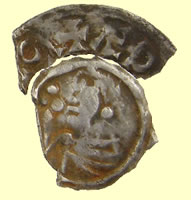
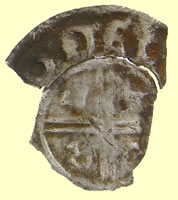
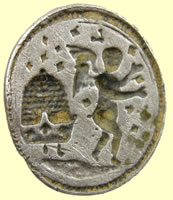
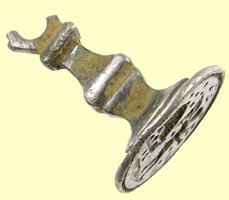
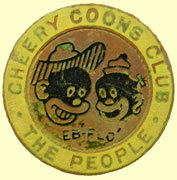

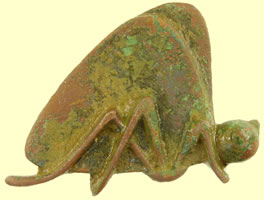

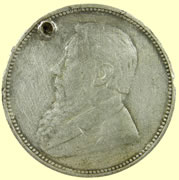




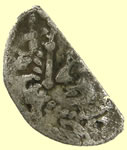

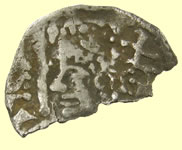
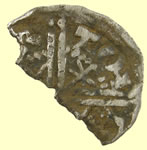
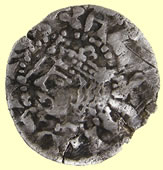
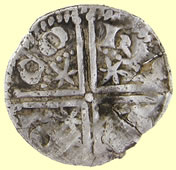
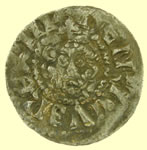
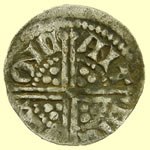
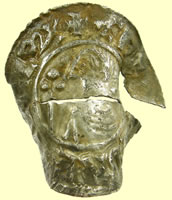
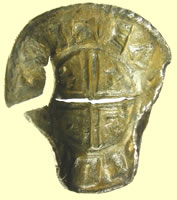
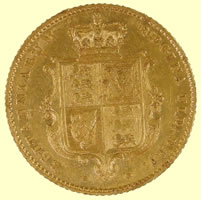
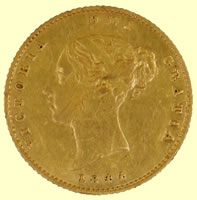
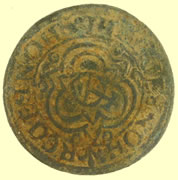
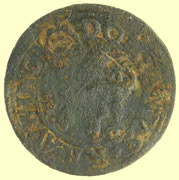
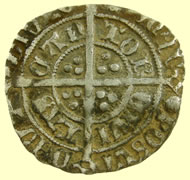
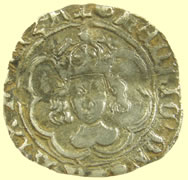
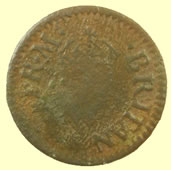
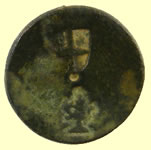
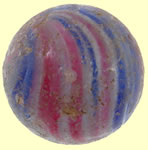
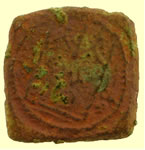
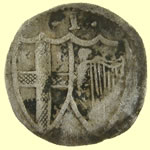
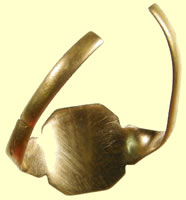
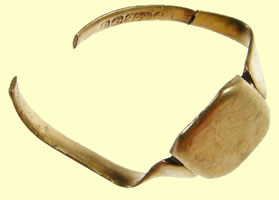
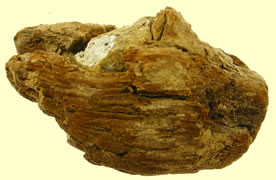
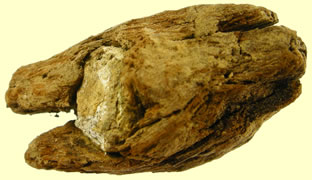


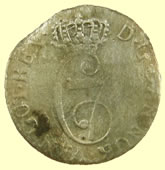

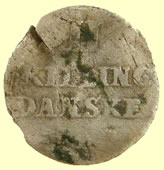

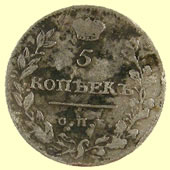
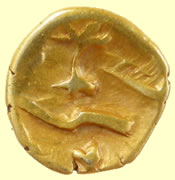
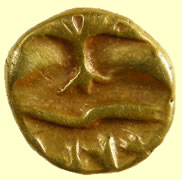
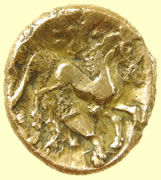
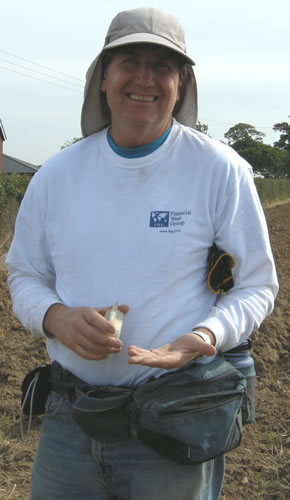

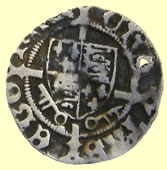
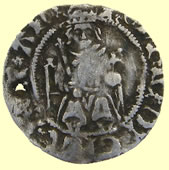
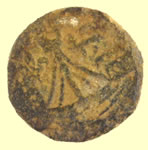

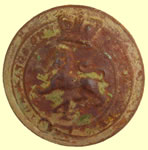
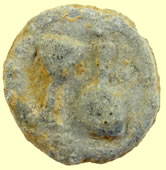
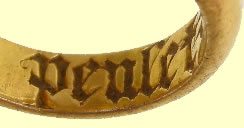
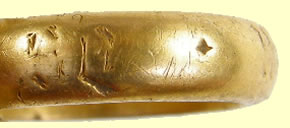
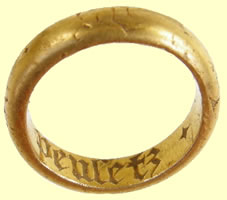

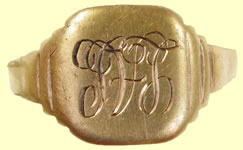
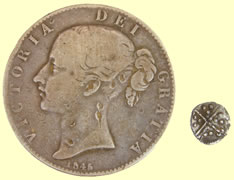
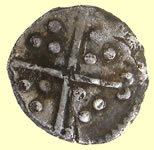
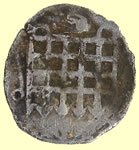
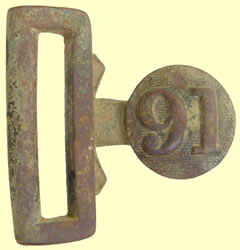
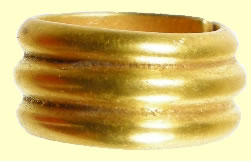
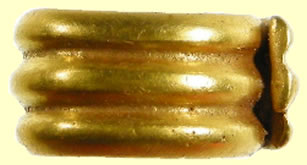
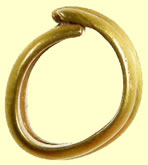
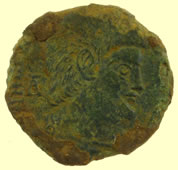
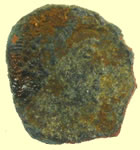
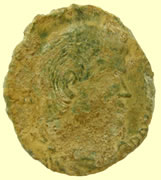




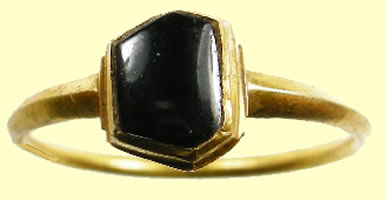
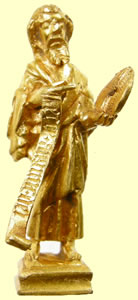


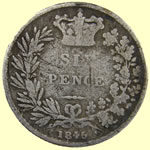




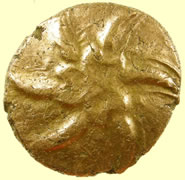


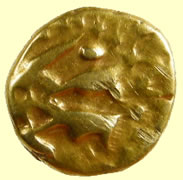
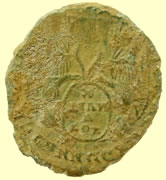
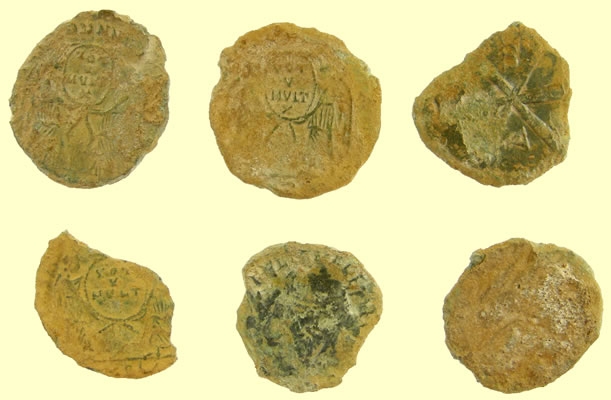
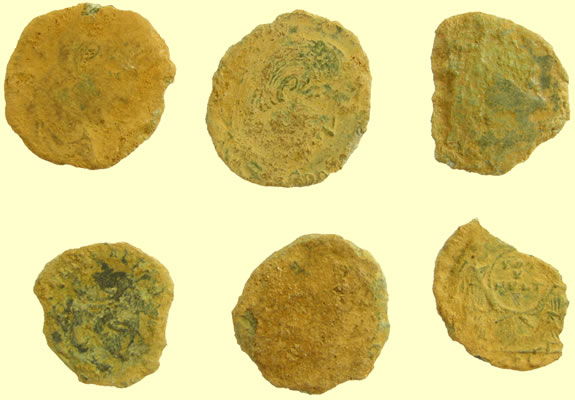
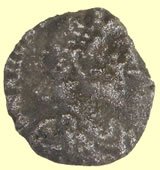
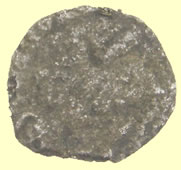
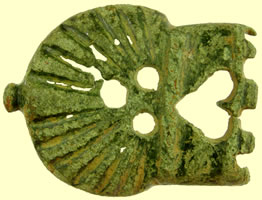
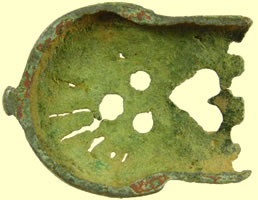
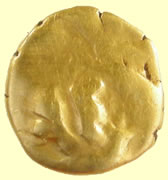
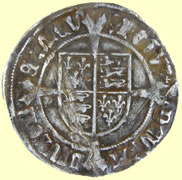
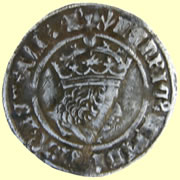
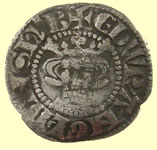
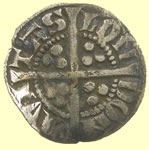
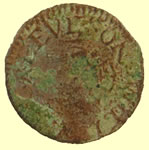
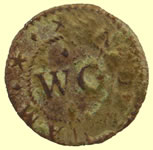
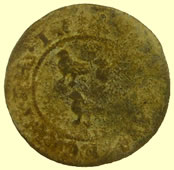
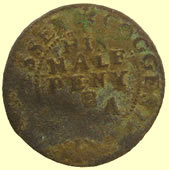
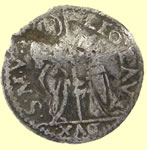
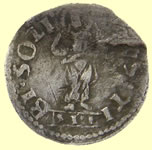
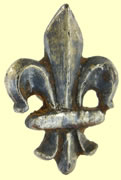
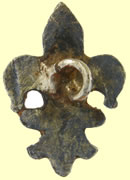
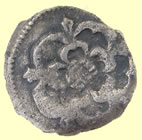
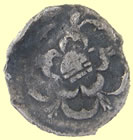

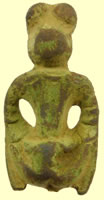
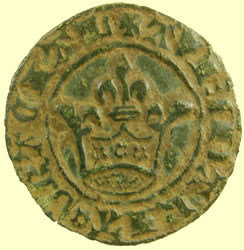
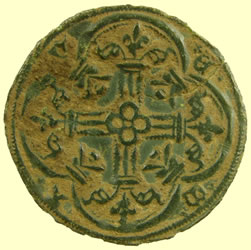
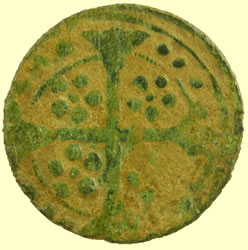
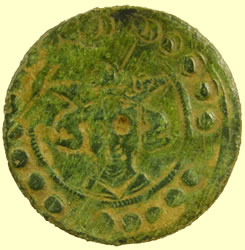
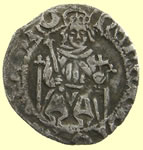
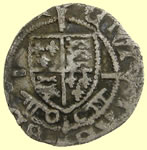
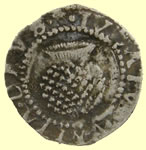
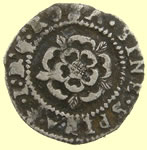
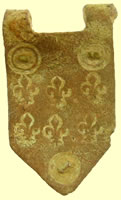
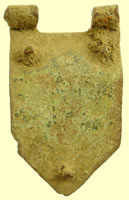
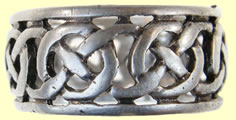
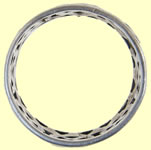
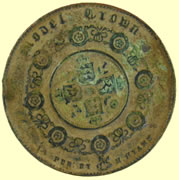
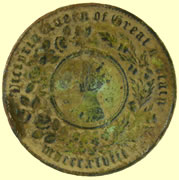
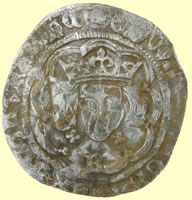
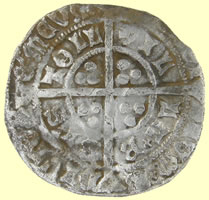

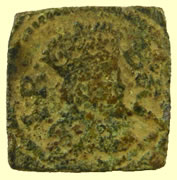

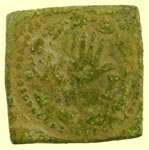
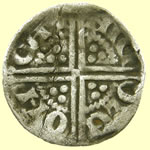
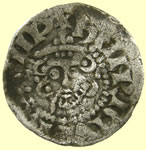
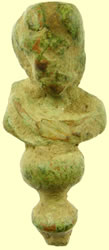
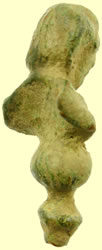
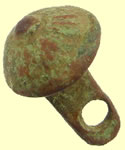
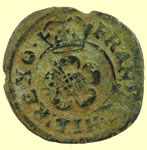
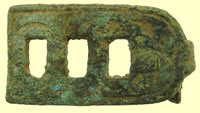
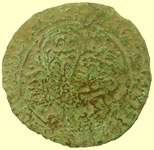
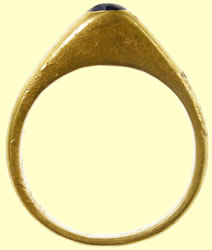

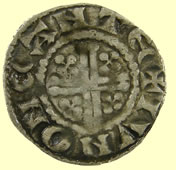
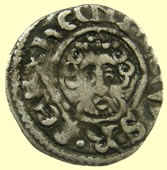
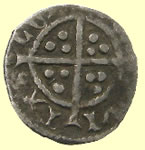
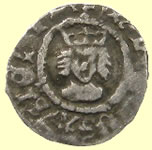
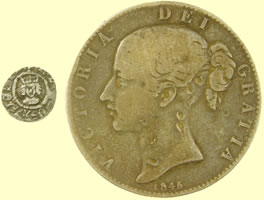
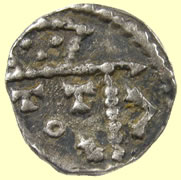
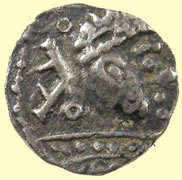
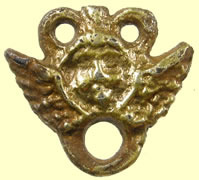
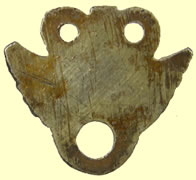
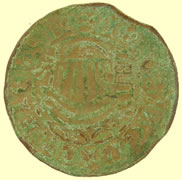
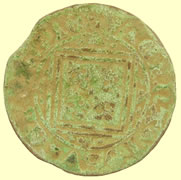
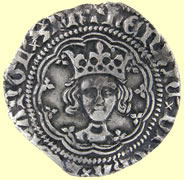
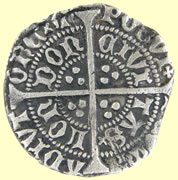
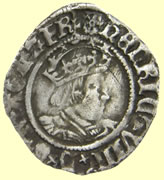




 'A
badge for a Knight of the Order of the Holy Sepulchre in bronze and
dating somewhere around C13/14th possibly very slightly later . This
is a very scarce item and it relates to The Equestrian Order of the
Holy Sepulchre of Jerusalem being a Catholic chivalric order of Knighthood
that traces its roots to Godfrey of Bouillon, principal leader of the
First Crusade. According to reliable sources in the Vatican and Jerusalem,
it began in historical reality as a mixed clerical and lay confraternity
(association) of pilgrims which gradually grew around the most central
of the Christian holy places in the Middle East, the Holy Sepulchre
or the tomb of Jesus Christ.This would have been a pin for a member
of the order , there is a mark on the reverse where the original pin
would have been fixed '
'A
badge for a Knight of the Order of the Holy Sepulchre in bronze and
dating somewhere around C13/14th possibly very slightly later . This
is a very scarce item and it relates to The Equestrian Order of the
Holy Sepulchre of Jerusalem being a Catholic chivalric order of Knighthood
that traces its roots to Godfrey of Bouillon, principal leader of the
First Crusade. According to reliable sources in the Vatican and Jerusalem,
it began in historical reality as a mixed clerical and lay confraternity
(association) of pilgrims which gradually grew around the most central
of the Christian holy places in the Middle East, the Holy Sepulchre
or the tomb of Jesus Christ.This would have been a pin for a member
of the order , there is a mark on the reverse where the original pin
would have been fixed '
